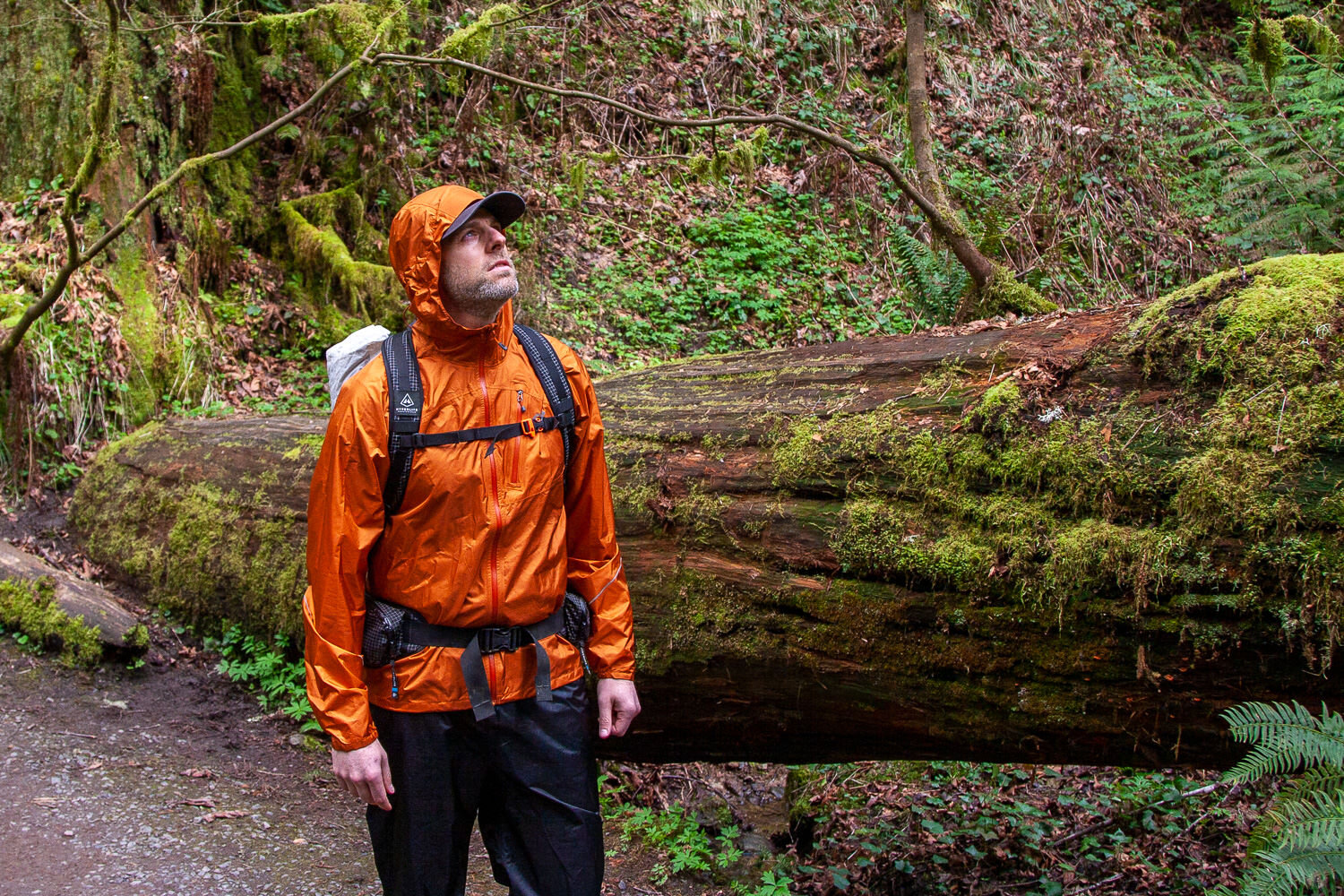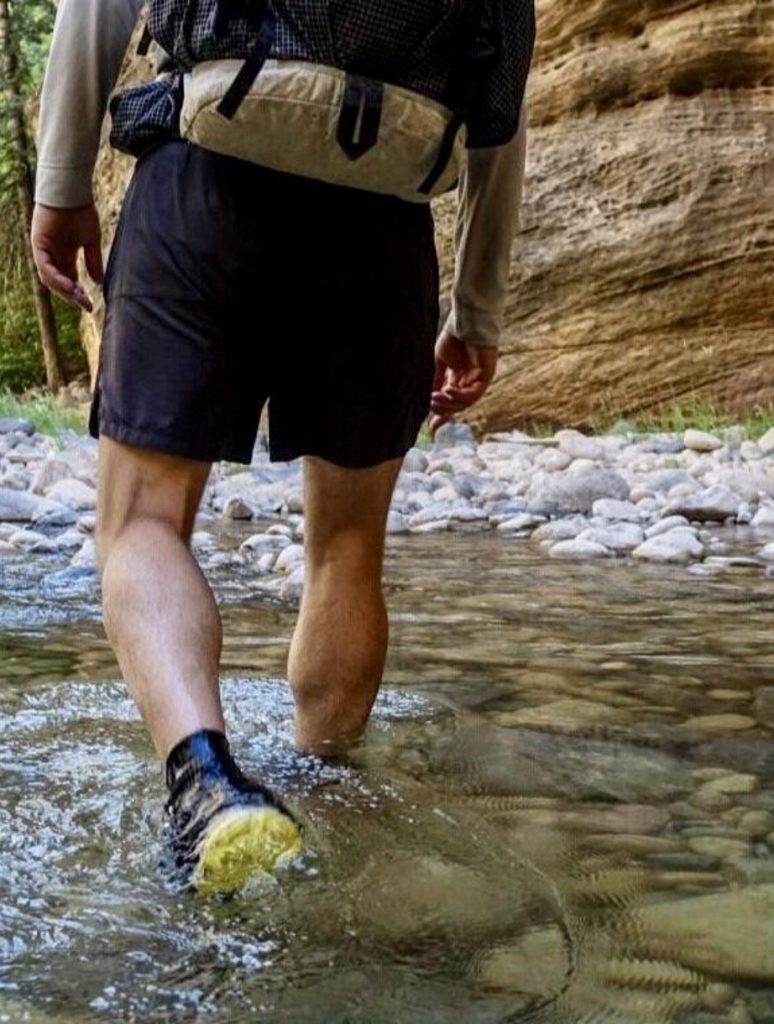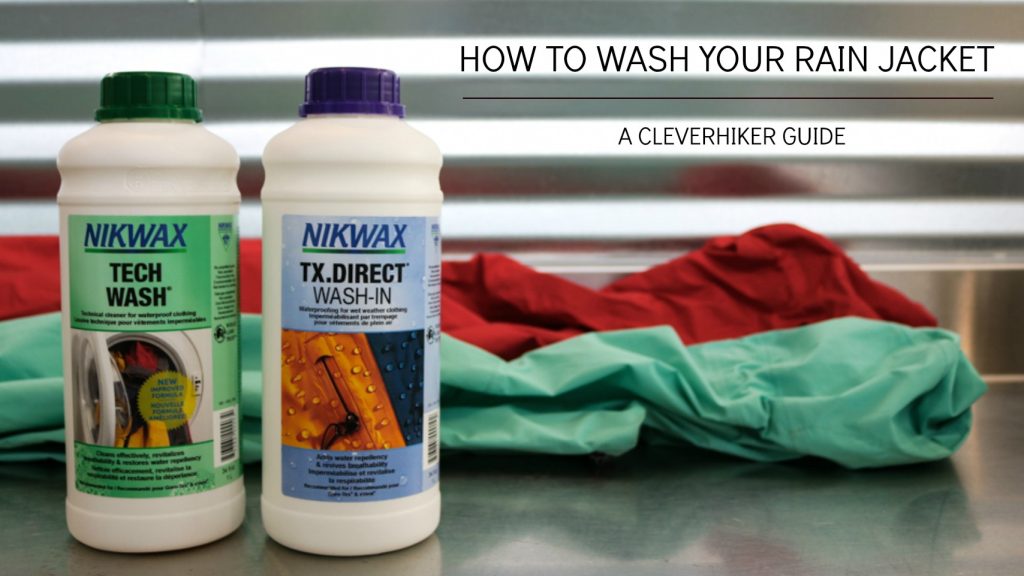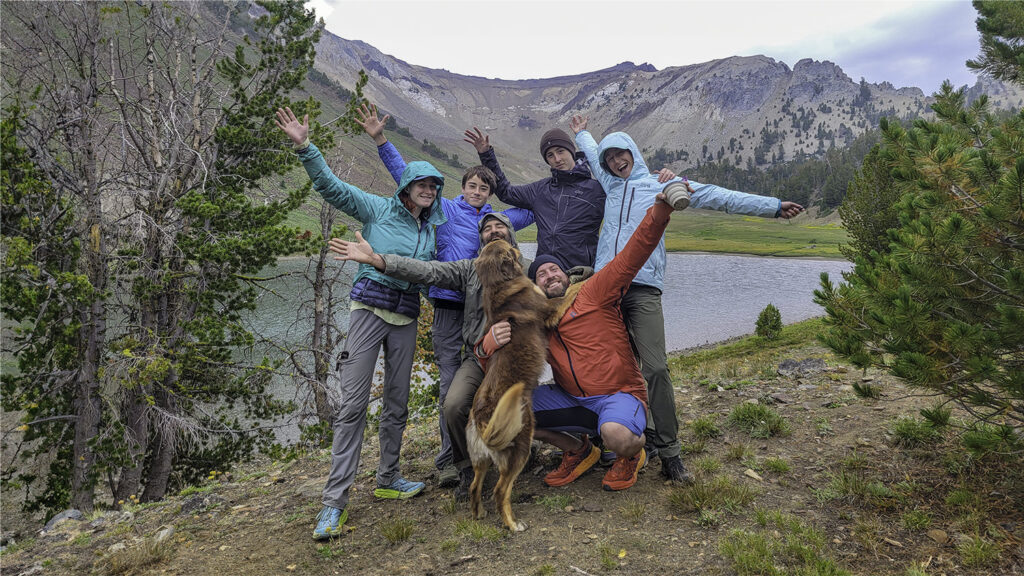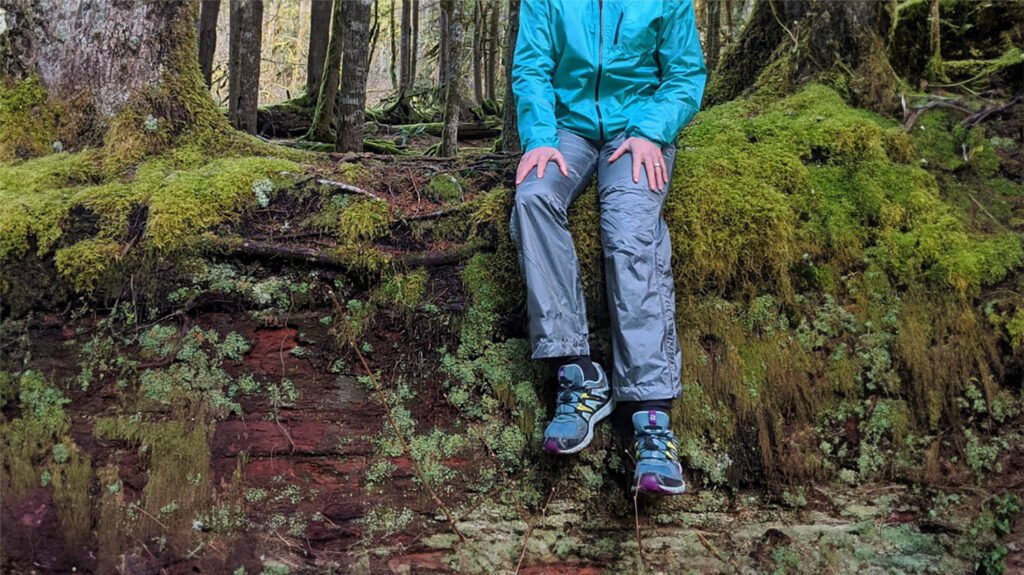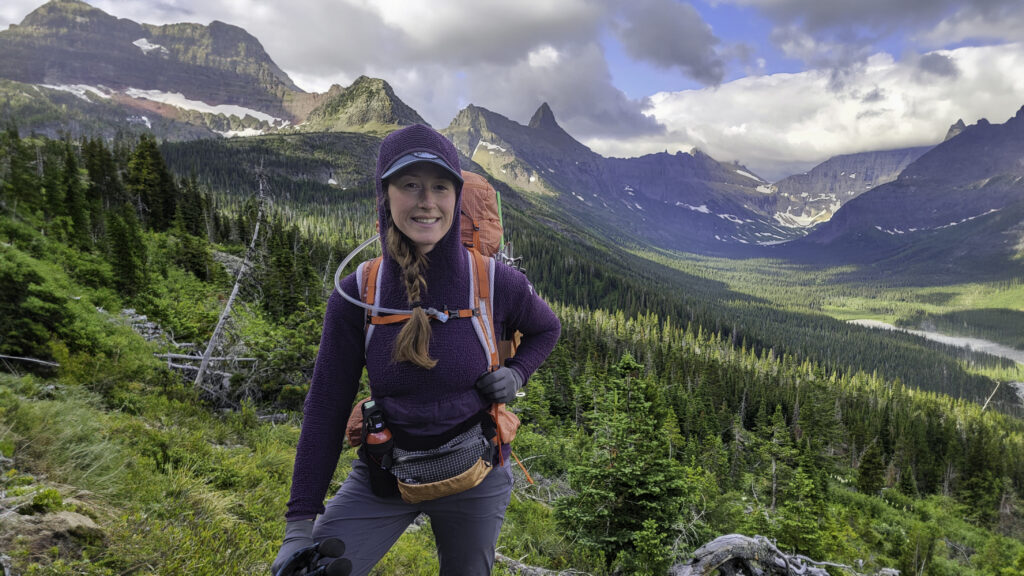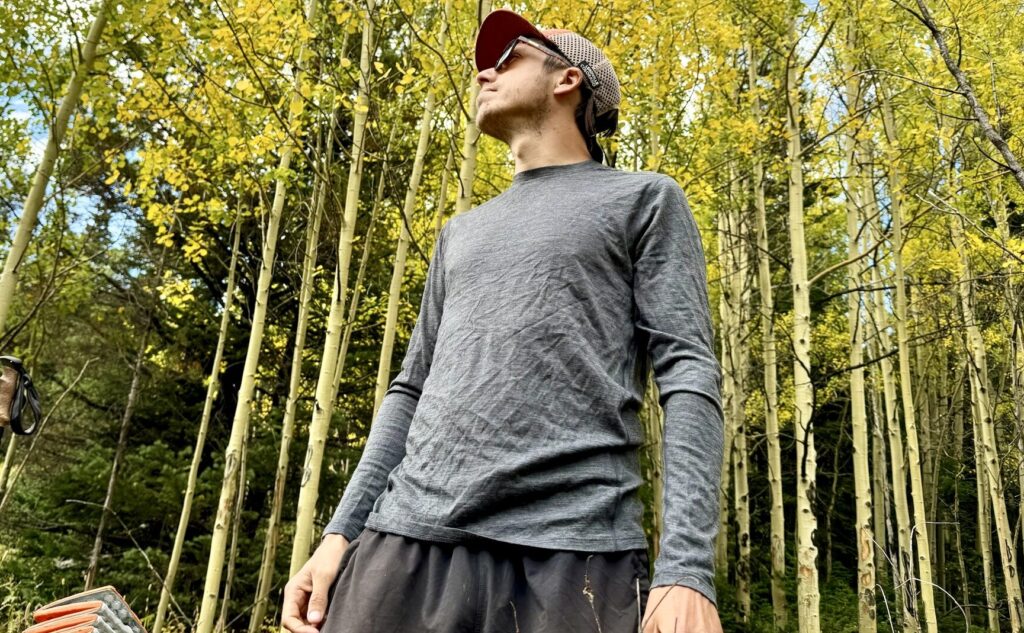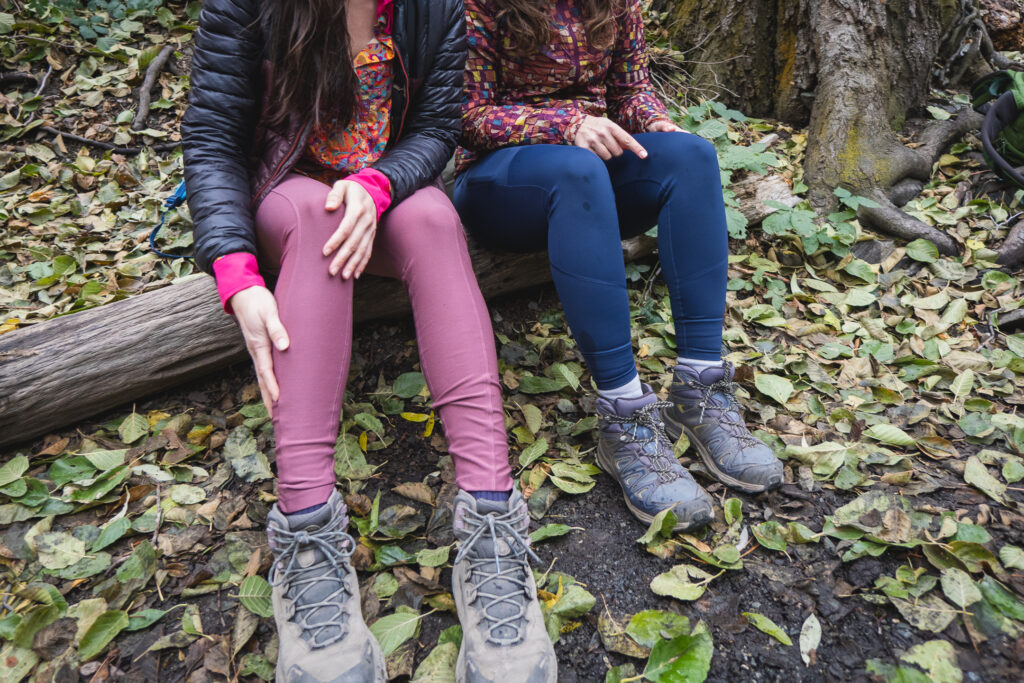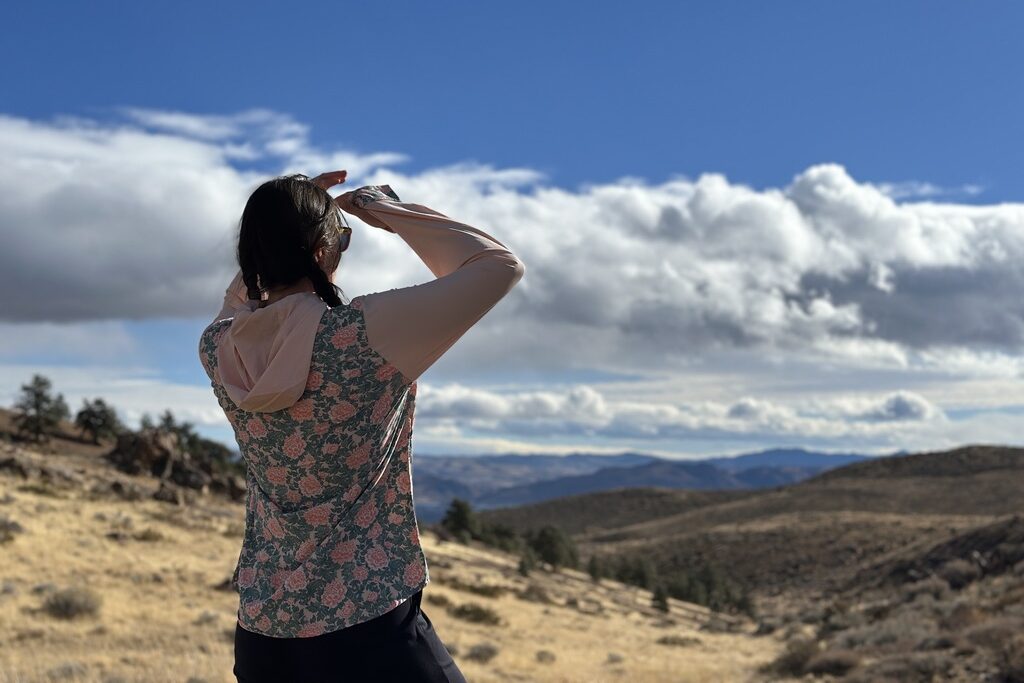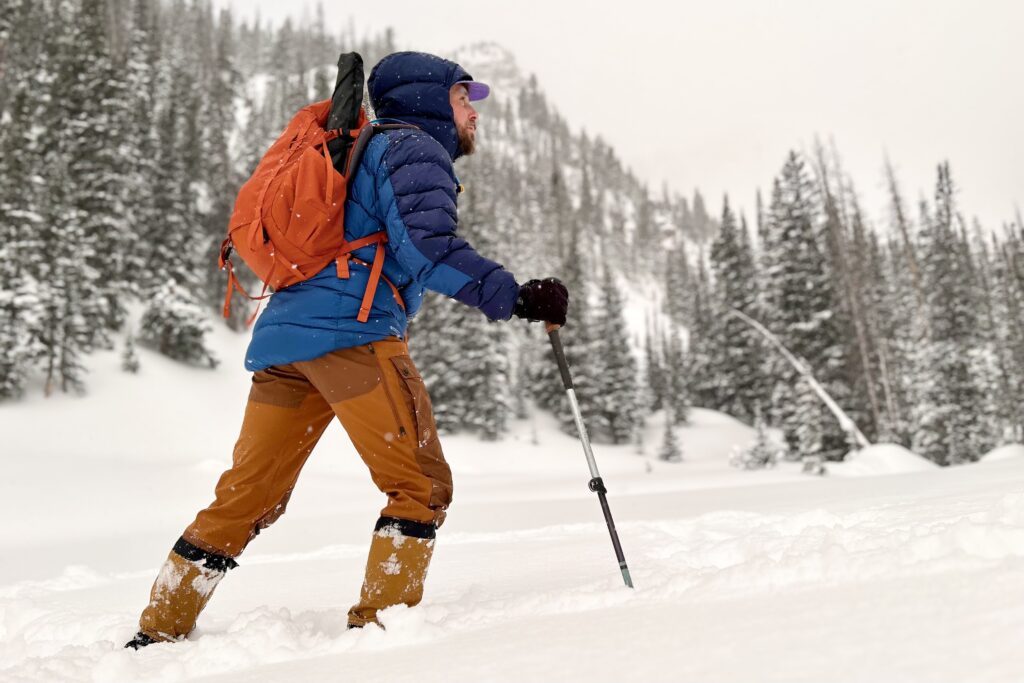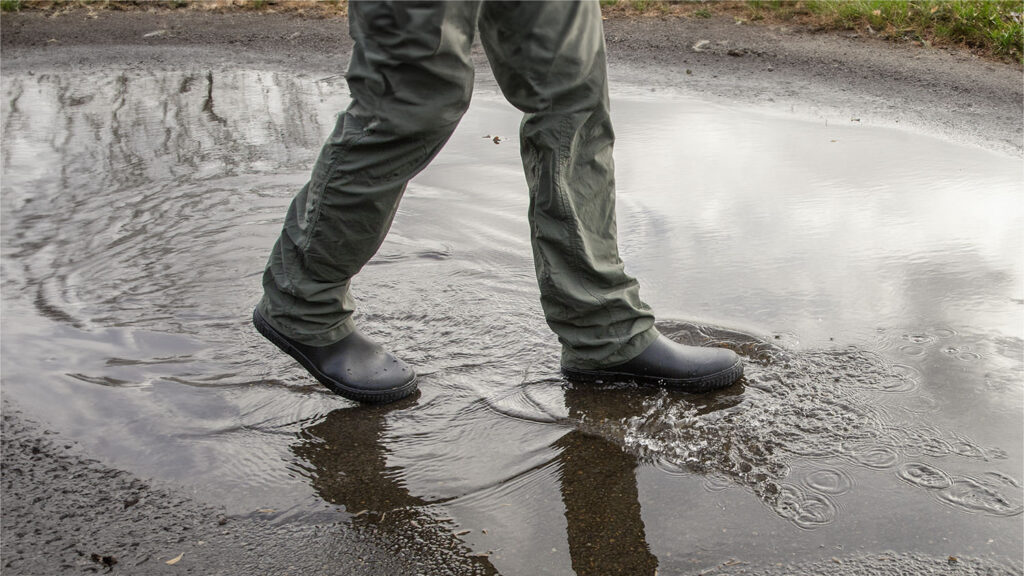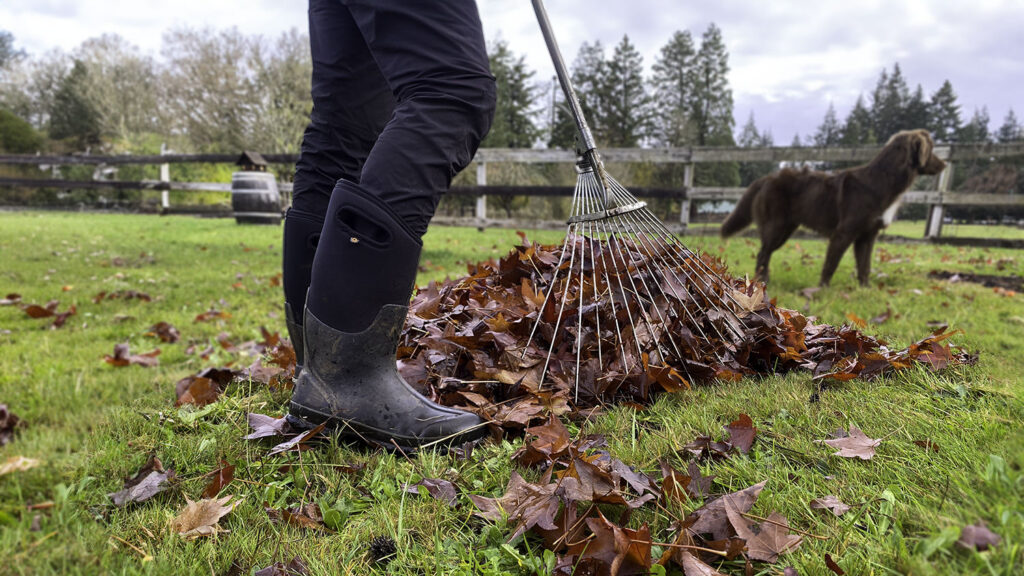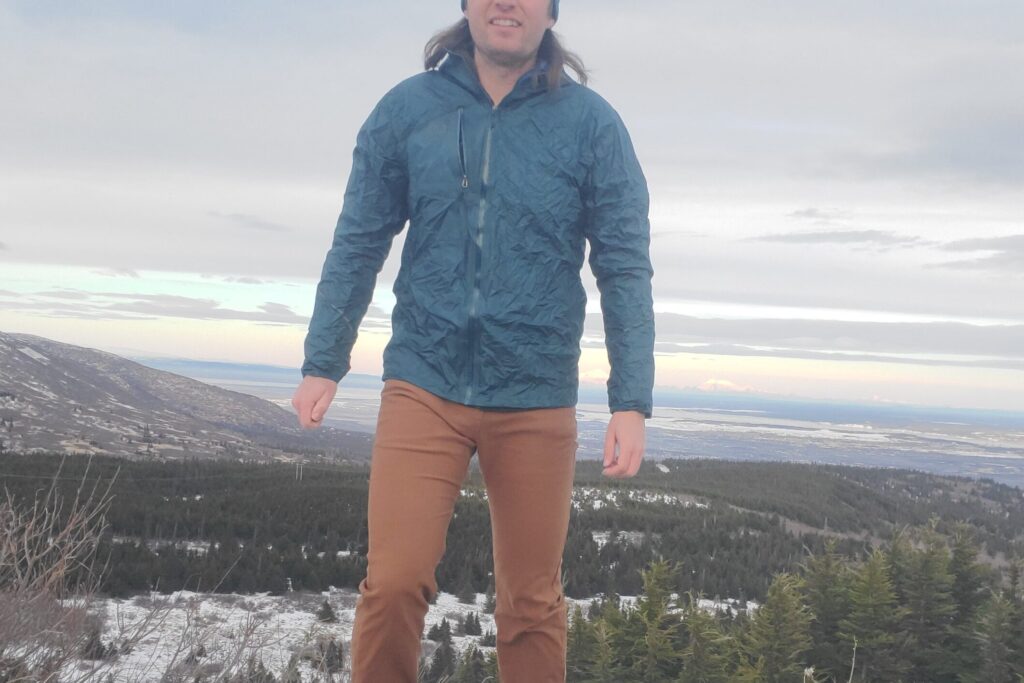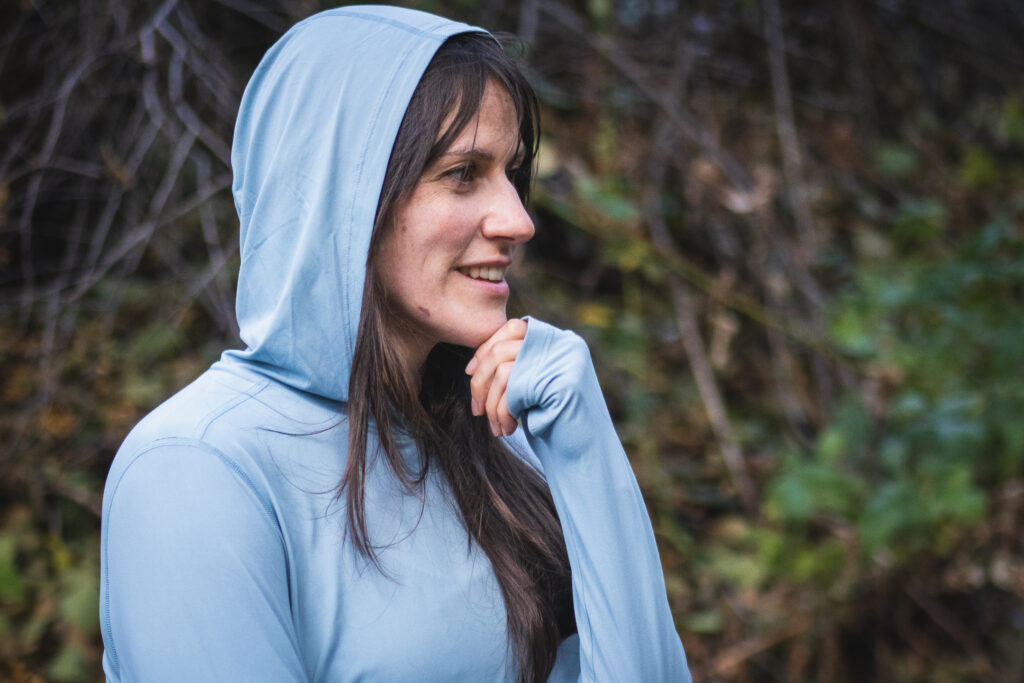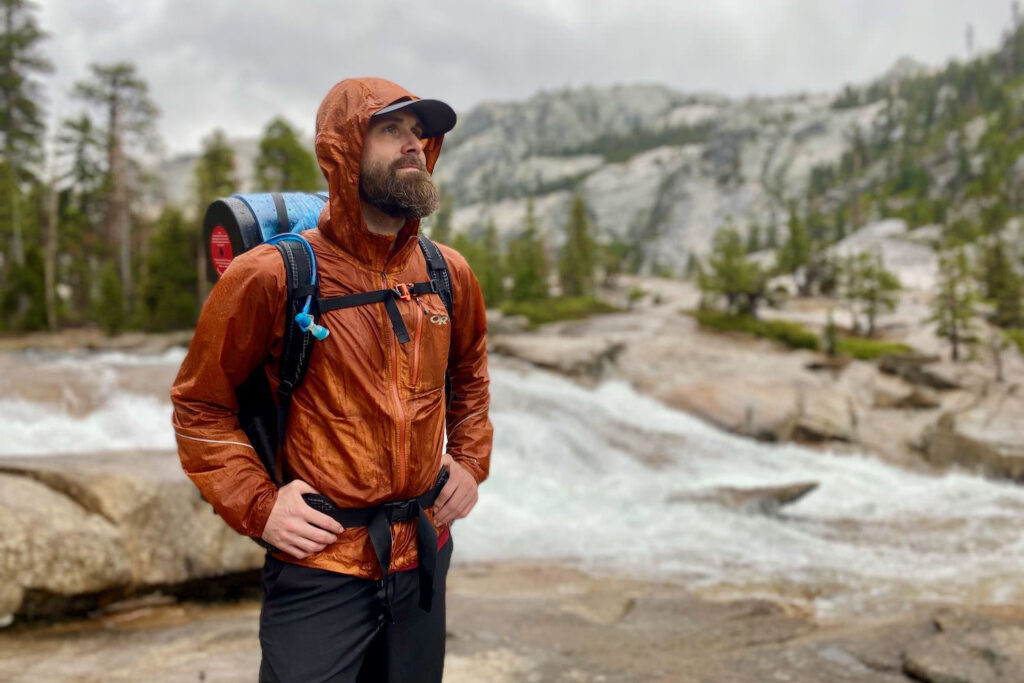
A quality rain jacket is a staple for any outdoor adventure: it will shield you from rain, wind, and cold and keep you dry, warm, and comfortable. Our team of seasoned backpackers and dedicated gear buffs have trail-tested more than 60 models based on comfort and mobility, water resistance, ventilation, weight, and durability. We found the most promising jackets from brands like Patagonia, Arc’teryx, Marmot, REI, Outdoor Research, and more to see how they perform in real-world conditions.
And for more info, check out some of our other popular gear guides:
Quick Picks for Rain Jackets
Take a look at this quick list of our favorite rain jackets or continue reading to see our full list with in-depth reviews.
Best Rain Jacket Overall: Patagonia Torrentshell 3L – Men’s / Women’s ($179)
Best Rain Jacket for Ventilation: Outdoor Research Foray 3L – Men’s / Aspire 3L – Women’s ($225)
Best Budget Rain Jacket: REI Rainier – Men’s / Women’s ($100)
Super Comfortable Rain Jacket: Mountain Hardwear Stretch Ozonic – Men’s / Women’s ($230)
Best Ultralight Rain Jacket: Montbell Versalite – Men’s / Women’s ($260)
Most Protective Rain Jacket for Wet Conditions: Arc’teryx Beta – Men’s / Women’s ($400)
Breathable Ultralight Rain Jacket: Zpacks Vertice – Men’s / Women’s ($299)
Lightweight & Affordable Rain Jacket: Black Diamond Fineline Stretch – Men’s / Women’s ($180)
High Value Rain Jacket: REI Flash Stretch – Men’s / Women’s ($169)
Most Affordable Ultralight Rain Jacket: Outdoor Research Helium – Men’s ($170) / Women’s ($180)
Affordable & Versatile Rain Jacket: Marmot Precip Eco – Men’s / Women’s ($120)
Overall Testing Scores for Rain Jackets
What’s new
After many drizzly desert mornings and massive mountain thunderstorms, we’ve updated our list:
- The Outdoor Research Foray 3L (men’s) / Aspire 3L (women’s) are top contenders for their unrivaled ventilation, quality construction, and cool colorways.
- The Arc’teryx Beta (men’s / women’s) earns a spot thanks to its durable and quiet fabric and excellent hood design.
- We added the brand new and super comfy REI Flash Stretch Jacket (men’s / women’s), a great choice for 3-season hiking thanks to an oversized fit and quick-drying fabrics.
- The affordable and practical Marmot Precip Eco (men’s / women’s) gets the nod as a less expensive, comfortable rain jacket.
- We added suggestions for ponchos for hiking based on comfort, versatility, and packed size as well as our picks for the best umbrellas for hiking.
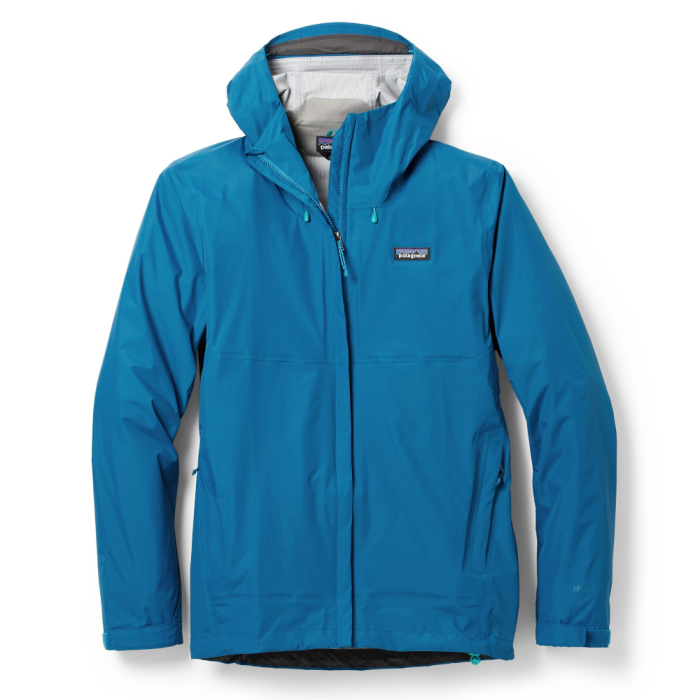
Patagonia Torrentshell 3L
Best Rain Jacket Overall
CleverHiker Rating: 87.3/100
Price: $179
Listed Weight: 14.1 oz. / 12.4 oz.(men’s / women’s)
Pros
- Durable materials
- High-quality construction
- Deep pockets
- Pit zips
- Stylish fit
- Strong hem & sleeve ties
- Packs small into its own pocket
- Hood rolls up
- Tons of colorways
Cons
- A bit heavy/bulky for extended backcountry trips
- A bit baggy in sleeves
- No external chest pocket
The Patagonia Torrentshell 3L (men’s / women’s) has been at the top of our list for many years, and for good reason. It’s one of our go-to rain jackets and all-time favorites. From 150-day thru-hikes of the CDT including torrential downpours, high-alpine blizzards, and drizzly fall weather, to trips skiing, camping, and hiking the local trails, this jacket is a durable, affordable workhorse.
The Torrentshell features laminated triple-layer construction that makes it protective in sustained rain, but still feels impressively lightweight on your body. The hood is adjustable and features a large visor to keep the rain out of your eyes and off your face, but it also rolls away easily with a cord and hook when not in use.
For a rain jacket, the Torrentshell is cozy. A soft microfleece lining at the neck adds a soft-to-the-touch feel and wicks away moisture with ease. This jacket has two hand warmer pockets as well as storm flaps – overlapping material that covers the main zipper and pit zips to help you stay dry.
Even though it’s a bit bulky, the Torrentshell still packs down small into the left hand warmer pocket and comes with a convenient carabiner loop so you can keep it easily accessible when the skies open up.
The only major complaint we have about the Torrentshell is its weight. At 14.1 ounces for the men’s version and 12.4 ounces for the women’s, there are other jackets on this list that are better suited for long-distance trips where shaving pack weight is important. So if you’re considering the Torrentshell exclusively for backpacking, we’d recommend other options on this list.
Though it’s not as airy or compressible as some, we highly recommend it for adventures when stormy conditions are inevitable. The Torrentshell is a versatile, reasonably affordable, and very durable jacket that we recommend for all-around use.
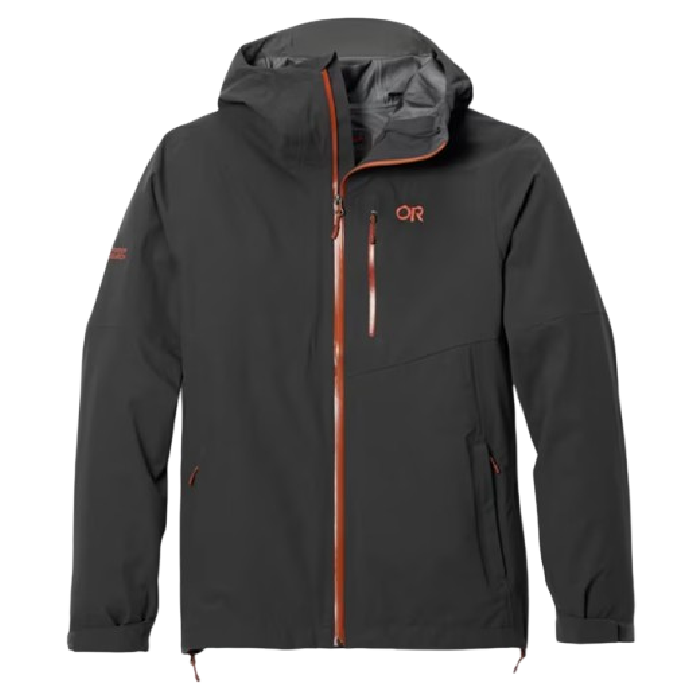
Outdoor Research Foray 3L / Aspire 3L
Best Rain Jacket for Ventilation
CleverHiker Rating: 86/100
Price: $250
Listed Weight: 11.9 oz. / 11.7 oz.(men’s / women’s)
Pros
- Extra-long pit zips for unrivaled ventilation
- Durable materials
- High-quality construction
- Deep handwarmer pockets
- External chest pocket
- Supple, flexible material
- Many colorways
- Packs small into its own pocket
Cons
- A little pricey
- A bit tight for those with wide shoulders
Thanks to excellent ventilation and smart design details, the Outdoor Research Foray (men’s) / Aspire (women’s) earns a spot at the top of our list. This jacket offers some of the best ventilation on the market, top-tier wind and rain resistance, and a stylish cut. CleverHiker Managing Editor, Ben Applebaum-Bauch, has used the Foray II on dozens of day hikes from the iron skies of Michigan to the rugged high alpine of the Colorado Rockies, it’s one of his go-tos for wet weather, and it continues to perform season after season.
If you’re looking for a jacket with breathability, the Foray and Aspire take ventilation to the next level. We love rain jackets with large pit zips for their breathability, but these Outdoor Research models have zippers that extend from the armpit all the way to the bottom hem. This versatile design allows you to completely unzip the jacket down your torso for extreme, poncho-style ventilation, or very precisely control how much airflow you want to keep your entire upper body cool.
Details matter when it comes to performance gear, and the Foray and Aspire are no exception. A simple hood drawcord is well placed and easy to reach, and large hem drawstrings make micro-adjustments a breeze while on the move. We love that the Foray and Aspire’s cuffs offer both elastic and large Velcro tabs for use with bulky gloves.
We found the fit is a bit tight through the shoulders, so if you’ve got a broad or wide build, you’ll want to double-check sizing. And though this jacket is a little pricey, you’ll be hard-pressed to find a better value for a relatively lightweight, super-breathable option. When the weather begins to turn and the skies open up, this jacket is a stellar option for staying both dry and well-ventilated.
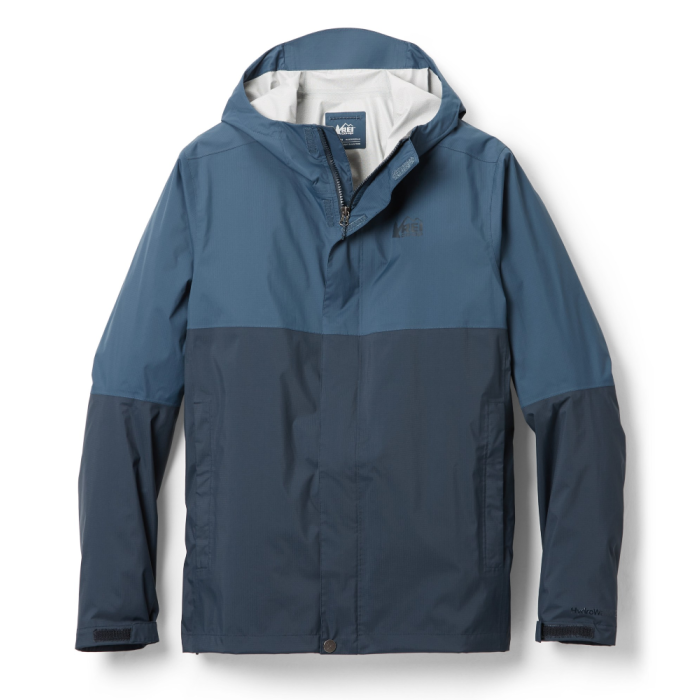
REI Rainier
Best Budget Rain Jacket
CleverHiker Rating: 85/100
Price: $100
Listed Weight: 11.3 oz. / 9.9 oz.(men’s / women’s)
Pros
- Affordable
- Lightweight
- Button at bottom of zipper flaps keeps rain out
- Lots of colorways
- Deep zippered handwarmer pockets
- Pit zips
- Packs into itself
- Oversized hood
Cons
- Less durable than others
- No external chest pocket
- A bit challenging to pack into stash pocket
The REI Rainier rain jacket (men’s / women’s) has been a favorite of hikers, backpackers, and our team at CleverHiker for a long time. For only $100, this jacket offers a stellar value: it’s well-designed and balances light weight and weather protection. The Rainier has been one of our favorite jackets as a team over thousands of miles on trail, from day hikes in the Cascades to weeks at a time in the Colorado Rockies, and it has performed extremely well.
The Rainier covers all the basics and adds small details we love. Articulated elbows offer a better range of motion with layers on, there are two internal drop pockets – unlike many jackets, which have one (or none) – and the hood is adjustable with a large Velcro tab that’s easy to manipulate even when your hands are wet and cold. Plus, it has pit zips and a practical drawstring hem.
The Rainier offers a slim but modern style, so it doesn’t look out of place whether you’re headed to the local brewery after walking the dog under dreary skies or backpacking on a stormy weekend. We appreciate that the newest version is a bit quieter thanks to a refreshed nylon blend, and the Rainier comes in an array of colorways, from brighter to muted and mellow for every style.
The cons of the Rainier are few. At its price point, it’s a little less durable than burlier models but we have gotten several seasons of use from different versions. It’s also a bit cumbersome to stash into its own pocket, although it makes for a fairly compact package once all the material is collapsed.
The Marmot PreCip Eco is almost identical to the Rainier. Both are great budget jackets, but we slightly prefer the Rainier for its wider availability, quieter fabric, slimmer fit, and better price point.
When you’re heading into drizzly and damp conditions, exploring a new route with friends, or knocking out a few dozen miles of backcountry trail, the Rainier is an excellent rain jacket at a stellar price.
More: REI Rainier Full Review
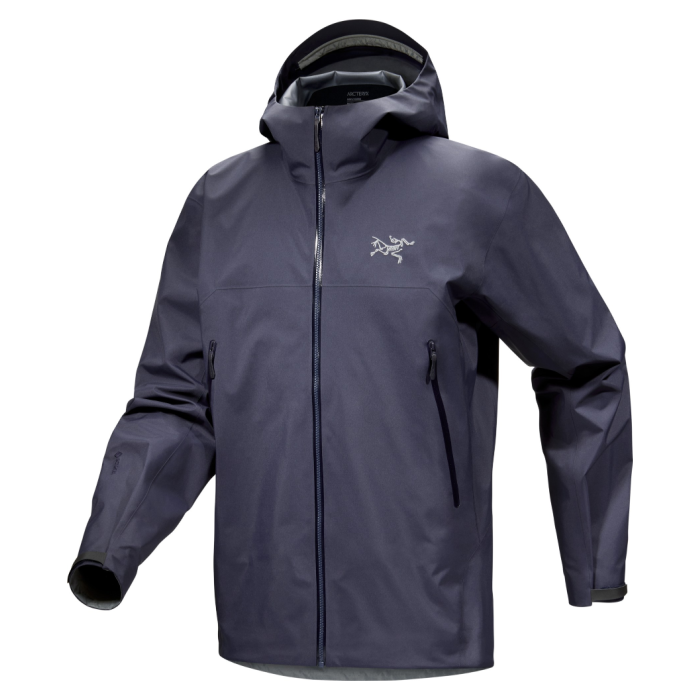
Arc’teryx Beta
Most Protective Rain Jacket for Wet Conditions
CleverHiker Rating: 84.8/100
Price: $400
Listed Weight: 10.6 oz. / 9.5 oz.(men’s / women’s)
Pros
- Durable materials
- Highest quality build
- Smart hood design
- Hipbelt compatible pockets
- Quieter fabric
- Excellent in downpours
Cons
- Very expensive
- No storm flaps over zippers
- Slim fit isn't for everyone
- No pit zips
The Arc’teryx Beta (men’s / women’s) is a top choice for its superior waterproofing. From the rigors of everyday on-off wear to keeping you dry in the gnarliest, wettest rainstorms (or even alpine blizzards), this is the only shell you’ll need for staying dry in nasty weather.
If you’re undeterred by extreme wet conditions, the Beta jacket is for you. This model’s three-layer Gore-Tex fabric sheds water easily and feels durable in heavy rain, sideways sleet, and whipping snow – and the newly redesigned Beta is now produced without PFAS, which translates to less pollution during production and a more mindfully-made jacket. The drop hem at the back effectively directs and sheds water away from your body as you move. We also appreciate the ergonomic, oversized zippers that are easy to grasp even with bulky gloves on.
The Beta stands out for its dialed-in design: the fabric feels impenetrable, but the fit is roomy enough at the shoulders and elbows to move naturally with you. We find this athletic construction performs admirably on the toughest alpine days where every detail matters. CleverHiker Gear Analyst, Ian Krammer, has used this jacket as his go-to shell to climb hundreds of 13,000-foot Colorado peaks in frigid winter conditions and has also used it in soaking July thunderstorms while climbing in the Rocky Mountains.
We also love the hood design of the Beta. Its high internal collar blocks wind and rain by locking in snugly under the chin, and helps retain a bit of extra warmth in cold, pressing wind. The overlapping hood adjustments fit precisely and snugly around your face, and the wide visor keeps even driving, sideways rain at bay. The hood is helmet-compatible, but it doesn’t feel floppy on its own.
The biggest downside of the Beta is its price tag. This is one of the most expensive jackets we’ve ever tested. The Beta is also bulky compared to other options on this list – it doesn’t pack down well, and this model certainly isn’t the lightest out there.
That said, heft is a small con in the face of serious storms, and this is the jacket our team trusts most in severe rain and snow conditions. And if your use case is a little different, the Beta also comes in an insulated version (men’s / women’s) and lightweight version (men’s / women’s).
The Beta is worth the investment for those who need a rain jacket that will last season after season of hard use in wet weather. If you’re on the hunt for a technical rain jacket that can truly do it all, this is the one.
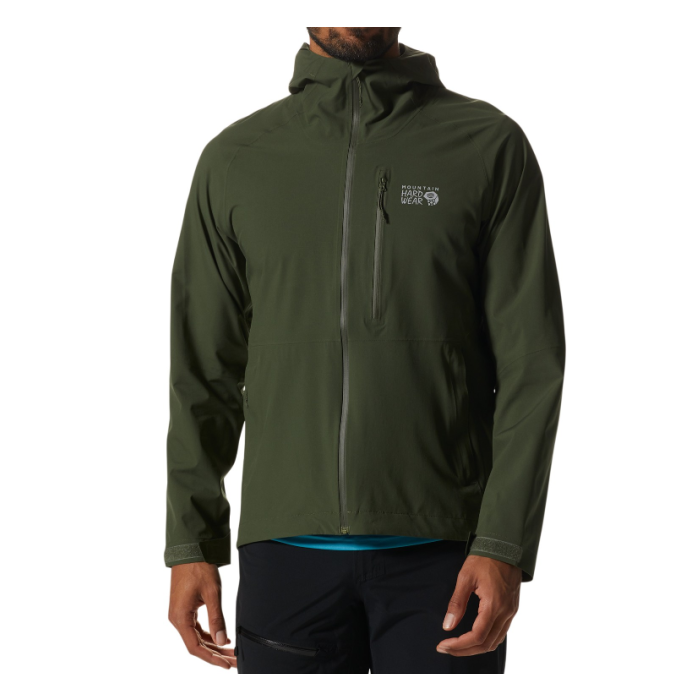
Mountain Hardwear Stretch Ozonic
Super Comfortable Rain Jacket
CleverHiker Rating: 82.8/100
Price: $230
Listed Weight: 10.7 oz. / 9.9 oz.(men’s / women’s)
Pros
- Stretchy & comfortable
- Lightweight
- Quieter fabric
- Large chest pocket
- Deep handwarmer pockets
- Large pit zips
- 2 adjustable hem cords
- Packs small into itself
Cons
- Hood visor isn’t as wide or long as some
- Velcro cuffs are thin & less sticky
If comfort is your top priority, you’ll love the Mountain Hardwear Stretch Ozonic Rain Jacket (men’s / women’s). This versatile coat offers soft-to-the-touch fabric, practical pockets, and excellent waterproofing for trekking rugged trails.
The Ozonic continues to be one of the most comfortable jackets on our list – that’s why it stays near the top. CleverHiker Gear Analyst, Heather Eldridge, has worn this jacket on hundreds of day hikes because the stretchy fabric is soft to the touch and gives a relaxed, unrestricted feel that’s easy to move in. And thanks to the breathable fabric, the material is impressively quiet – you can actually hear what your friends are saying with the hood up!
The Ozonic has all the key elements we look for in a rain jacket: hand pockets, two-way hood adjustment, and pit zips, so it’s great for just about any activity. We also love its low weight. At 10.7 ounces for a men’s medium, the Ozonic is near the front of the pack, making it easy to carry, wear, and stuff away.
That said, this Mountain Hardwear classic has a couple of quirks. We find the fit is a bit unusual: it’s baggy through the torso and the sleeves are on the shorter side. However, the major advantage of this looser fit is that it’s great for layering. If you love cooler-weather adventures where rocking a fleece and puffy is vital for comfort, you’ll have no trouble fitting warm layers underneath the Ozonic.
More than anything, we reach for the Ozonic because of its outstanding comfort, trendy profile, and trusty waterproofing. This jacket will shield you from windy, misty mountain summits and downpours alike.
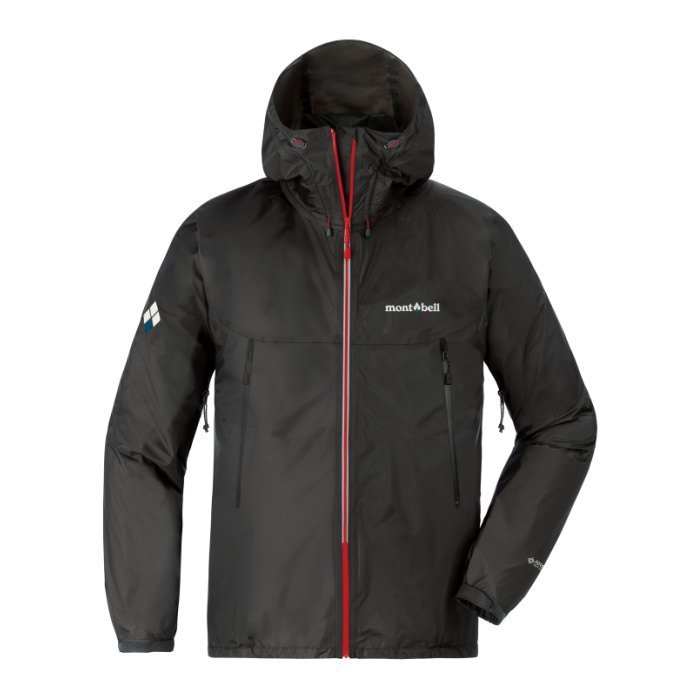
Montbell Versalite
Best Ultralight Rain Jacket
CleverHiker Rating: 81/100
Price: $260
Listed Weight: 6.4 oz. / 5.8 oz.(men’s / women’s)
Pros
- Ultralight
- Packs very small
- Highly adjustable hood
- Excellent feature set
- Pit zips
- Stretchy & Velcro cuffs
- Hipbelt-compatible pockets
Cons
- No chest pocket
- Delicate material
- Slim fit isn't for everyone
When it comes to water resistance, the Montbell Versalite (men’s / women’s) is one of our all-time favorites for thru-hiking and ultralight adventures. This is CleverHiker Founder, Dave Collins’ go-to ultralight shell for backpacking and he’s used it for thousands of miles, from the Grand Sawtooth Loop in Idaho to the Glacier Peak wilderness. Gear Analyst, Casey Handley, also loves the Versalite, and it kept her dry and well-ventilated on a very soggy 273-mile thru hike of the Long Trail in Vermont.
If you’re looking for a truly airy shell to stay dry in short summer storms, this is the one. The men’s Versalite weighs a jaw-dropping 6.4 ounces, and the women’s is only 5.8 ounces. For perspective, that’s approximately the weight of two protein bars. And, it packs down to a very small package – about 3 by 3 by 5 inches – so this model easily slips into any pack without taking up much space.
Despite its incredibly low weight, the Versalite is as feature-rich as any jacket on this list. We love the three-way, super-adjustable hood and tall neck, the combination elastic and Velcro cuffs, and the extra long pit zips for dialed-in ventilation. The oversized hand pockets are higher up on the body to give unrivaled accessibility to pockets while wearing a climbing harness or thick backpack hipbelt, so you won’t have to unclip your backpack while walking to reach your chapstick or phone.
As with most ultralight gear, the Versalite sacrifices durability. It’s made with thin, featherlight materials, so you’ll have to be more careful with it than you would with a burlier jacket. It is also a little more crinkly and noisy than others. That said, we’ve been using this jacket for years without any notable issues and we think the dramatic weight savings makes it one of the best choices for long-distance backpacking.
While it’s on the spendy side, the Versalite is a very competitive price for a premium ultralight jacket. We highly recommend the Versalite to anyone who is looking for a minimalist layer with maximum functionality for a very low weight.
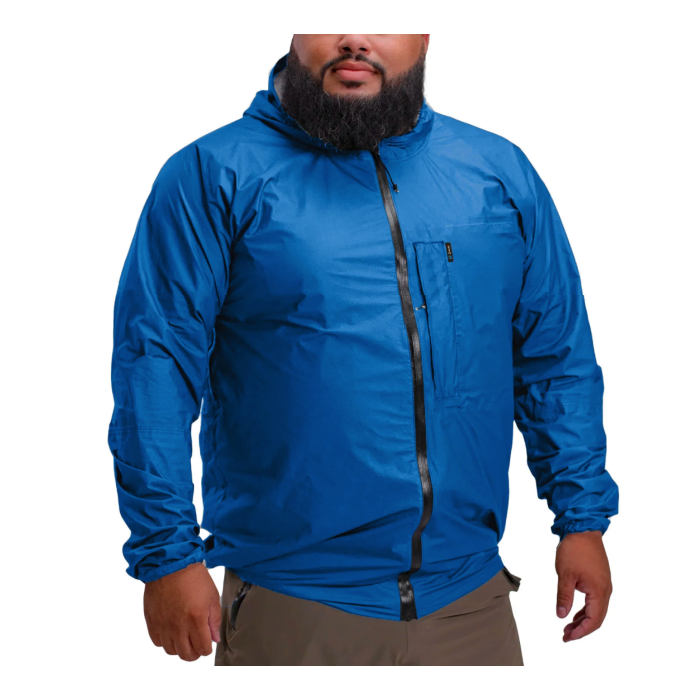
Zpacks Vertice
Breathable Ultralight Jacket
CleverHiker Rating: 79.8/100
Price: $299
Listed Weight: 5.75 oz. / 5.7 oz.(men’s / women’s)
Pros
- Ultralight
- Large chest pocket
- Pit zips
- Adjustable sleeves, hem & hood
- Hood rolls away
- Packs very small
- Fit accommodates layers well
- Excellent coverage
Cons
- Expensive
- No handwarmer pockets
- Oversized hood works best with hat
- Less durable
The Zpacks Vertice (men’s / women’s) is one of the lightest rain jackets available. Despite its featherweight status, this shell performs: it provides excellent protection in pouring rain, but remains impressively breathable. CleverHiker Senior Gear Analyst, Casey Handley, hiked the first 400 miles of the Colorado Trail in one of the wettest springs in the last decade and appreciated its long length and durability.
At about six ounces, the Vertice is in a league with the Montbell Versalite and the Outdoor Research Helium for ultralight jackets. Like the others, this one packs up incredibly small, so it’s ideal for long day hikes and thru-hikes where space and weight are the top priority.
The length of the Vertice is what sets it apart: this model is long enough to cover your bum, which is convenient when taking breaks on wet rocks or logs. It also means the seat of your shorts or pants won’t bear the brunt of the runoff from your jacket, so you’ll stay a little warmer when it’s wet out, and hopefully dry a bit faster.
The Vertice doesn’t skimp on any details either: ZPacks includes long pit zips, simple drawcords on the wrists, hem, and hood, and a handy mechanism for rolling up the hood when storms pass. The Vertice is also one of the most breathable jackets on our list, so it won’t cause you to overheat immediately when backpacking through the early afternoon rain.
That said, the Vertice is built for function in the backcountry, not fashion in the city. It has a baggier fit, so it’s best for larger body types and those who like a longer jacket. We also miss not having handwarmer pockets and the hood is a little floppy.
Like most ultralight gear, the Vertice is also on the spendy side, but if you want the best balance of low weight, crazy packability, and excellent coverage – this one is hard to beat. As long as you give it the care and attention it needs, the Vertice will last for thousands of miles.
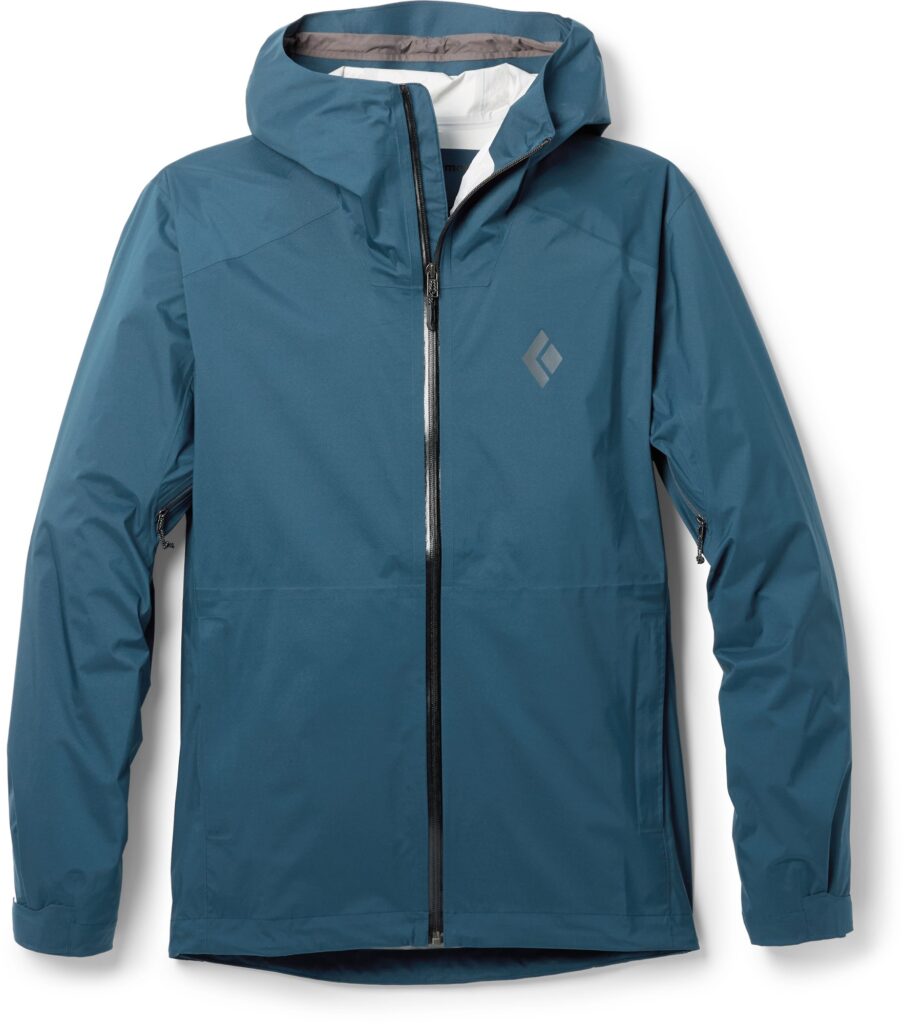
Black Diamond Fineline Stretch
Lightweight & Affordable Rain Jacket
CleverHiker Rating: 79.3/100
Price: $180
Listed Weight: 11.3 oz. / 9.5 oz.(men’s / women’s)
Pros
- Less expensive
- Lightweight
- Packs small into its own pocket
- High-quality construction
- Internal collar
- Pit zips
- Tons of colorways
Cons
- High collar & helmet compatible hood isn't for everyone
- No chest pocket
The Black Diamond Fineline Stretch jacket (men’s / women’s) hits the nail on the head for a great balance of affordability, high-quality construction, and useful features. If you’re looking for a savvy all-around jacket for backcountry hiking, the Fineline is up for the task.
It’s full of simple details that give it exceptional value. The long pit zips help with ventilation and the stretchy Velcro cuffs make the jacket easy to use with gloves on. The helmet-compatible hood is simple to adjust, and the tall collar is excellent at keeping out drafts and drips. We also love the wide variety of colorways available for the Fineline – no matter your vibe, there’s probably a color for you.
The Fineline’s material and fit are our favorite things about it. This model offers a regular-to-slim fit, with just enough stretch and gusseted armpits for mostly unrestricted big movements. The Fineline’s aesthetic is sleek enough to wear out to dinner on a stormy summer night, or for keeping you dry while setting up your tent in a misty frontcountry site.
However, this jacket is a bit further down the list largely because of its pocket design. We found the handwarmer pockets are a bit shallow, and positioned too low to access with a backpack or harness on. This model also doesn’t include a chest pocket.
Overall, the Fineline is a highly functional and attractive jacket that packs easily into an impressively small package for portability. Because of the thoughtful design and the affordable price point, the Fineline is one of the most well-rounded rain jackets on the market.
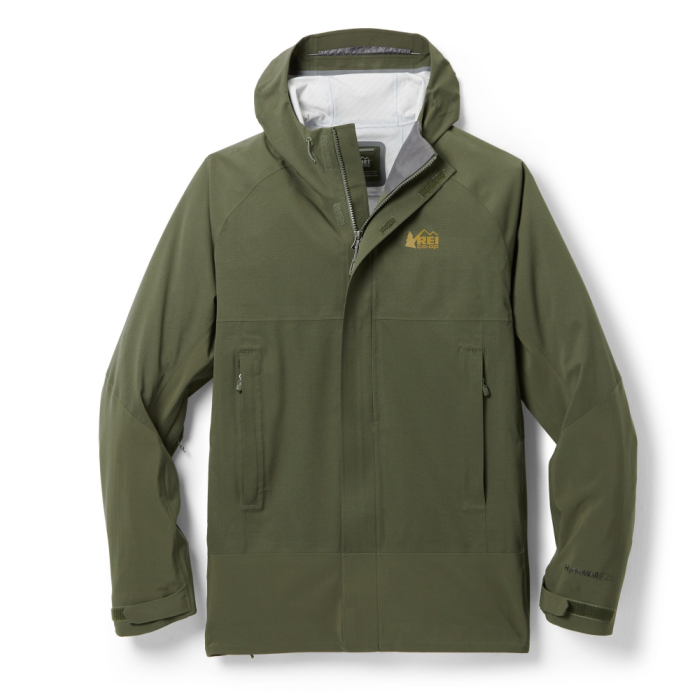
REI Flash Stretch
High Value Rain Jacket
CleverHiker Rating: 77.3/100
Price: $169
Listed Weight: 1 lb. 1 oz. / 14.5 oz.(men’s / women’s)
Pros
- Durable materials
- Excellent stretch
- High-quality construction
- Easy to layer
- Deep pockets
- Chest zipper
- Long pit zips
- High zippers compatible with harness
Cons
- Baggy / oversized fit
- Short visor on hood
- Long sleeves
- Heavy / bulky for extended trips
The REI Flash Stretch Rain Jacket (men’s / women’s) is an ultra stretchy and feature-forward jacket with a stellar balance of affordability and quality.
REI doesn’t skimp on any of our favorite features with the Flash Stretch: pit zips are plenty long enough to dump heat when you’re out of breath and moving through an afternoon rainstorm, and the hood offers three-way adjustments for a nuanced fit even while wearing a hat or helmet. It includes high-position handwarmer pockets for easy access while using a backpack, plus a large chest pocket for small storage. We also like that all the zippers have wide rain flaps to block the rain from dripping in.
We find the Flash Stretch is as cozy as rain jackets get. The polyester and spandex blend feels soft against the skin, and brushed polyester patches at the collar and chin are a nice touch when the hood is up and chilly wind is blasting. This jacket quickly became one of our go-tos for protection on short day hikes simply because it’s so comfortable.
The fit is baggier compared to other jackets, so it’s best for those who prefer a relaxed fit. However, the Flash Stretch is a perfect candidate for adding insulation layers – there’s plenty of room for a puffy or mid-layer underneath, and you won’t sacrifice a bit of extra mobility for that added warmth.
One drawback is that this jacket is one of the heaviest and bulkiest we tested. A smidge over a pound for the men’s Large makes the Flash Stretch one of our last picks for multi-day backpacking trips. That said, this REI model is a great option for daily wear and day hikes where weight isn’t a huge concern.
However, between the soft material, durable build, and excellent waterproofing, the Flash Stretch is a great option for everyday wear, whether you’re at an outdoor concert or heading into a rainy weekend of camping.
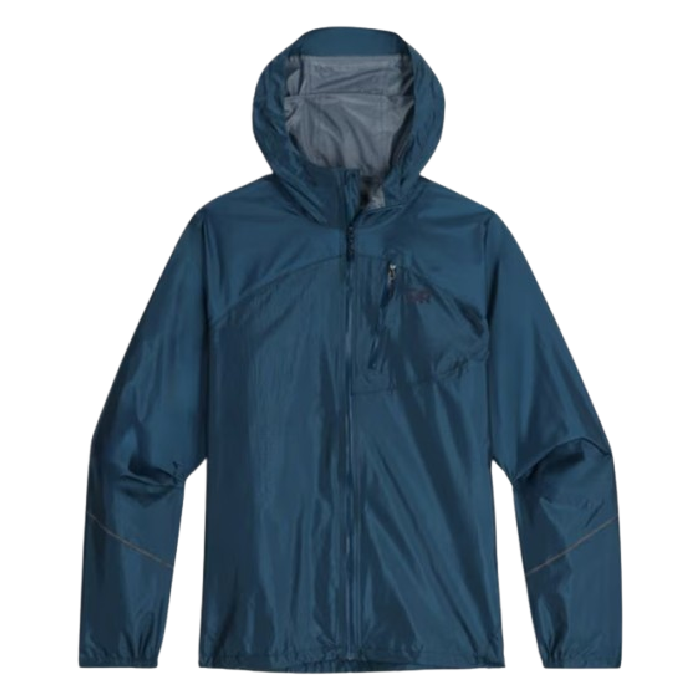
Outdoor Research Helium
Most Affordable Ultralight Rain Jacket
CleverHiker Rating: 76/100
Price: $170 (men’s) / $180 (women’s)
Listed Weight: 7 oz. / 6.3 oz.(men’s / women’s)
Pros
- Ultralight
- Less expensive
- Packs down very small
- Key clip in hand pocket
- Angled chest pocket
- Handwarmer pockets in women’s version
- Adjustable hood
- Many colorways
Cons
- No pit zips
- No hand pockets in men’s version
- No cuff tightening systems
When it comes to ultralight jackets, the Outdoor Research Helium (men’s / women’s) is one of the most practical options on the market. While it weighs almost the same as the ZPacks Vertice and the Montbell Versalite – just over six ounces – it’s less expensive and offers many of the same features.
CleverHiker Managing Editor, Ben Applebaum-Bauch, hiked the 3,000-mile Continental Divide Trail in this jacket and it held up well in most storms with plenty of room underneath for a lightweight down puffy. CH Gear Analyst, Heather Eldridge, also spent a week backpacking in Glacier National Park with this jacket and had no complaints – it kept both of them dry, comfortable enough, and it took up little space.
The Helium has a large chest pocket that makes access to small items easy and fast. This pocket is also the carrying case for the Helium, and it packs down into one of the smallest, most efficient packages on this list, perfect for backpacking and fastpacking.
This jacket is fairly thin and will wet out faster than others in really heavy rain, especially where backpack straps sit. Also, the men’s version doesn’t have handwarmer pockets, which we’ve found inconvenient on and off trail. This isn’t a dealbreaker for us, but we’d prefer the extra storage like the women’s version – instead, we bring waterproof gloves on cold, wet trips.
All-in-all, you cannot beat the price-to-weight ratio of the Helium. If keeping your overall pack weight low on long summer hikes is important to you, or you need a basic layer for cloudbursts and occasional summer storms, the ultra-packable Helium offers a stellar bang for your buck.
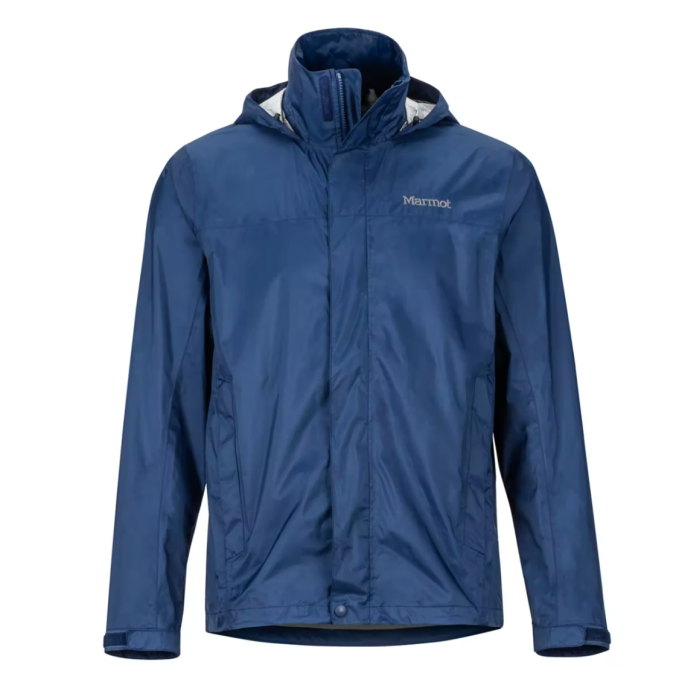
Marmot Precip Eco
Affordable & Versatile Rain Jacket
CleverHiker Rating: 75/100
Price: $120
Listed Weight: 11 oz. / 9 oz.(men’s / women’s)
Pros
- Deep pockets
- Pit zips
- Stowable hood
- Storm flaps over zipper help keep moisture out
- Higher pockets for hipbelt
- Less expensive
- Internal collar
- Many colorways
Cons
- Internal laminate lining is less durable
- Hood isn’t as adjustable
- Zipper pulls are small
- No chest pocket
- Wets out faster than more durable options
If you’re looking for a less expensive jacket for summer storms, the Marmot Precip Eco (men’s / women’s) offers a practical design, reliable water protection, and stylish colorways.
This Marmot model has plenty of features we look for in a quality rain jacket. The wide storm flap over the zipper helps keep moisture out. The internal collar is tall, and the wrap-around hood design offers a bit of extra protection when wind and rain are picking up. The hood rolls up and stows away and like other jackets on this list, it packs up into itself.
Some jackets are simply too technical-looking to transition easily into everyday life, but not the Precip Eco. This stylish jacket fits right in on the sidelines of your kids’ soccer game or a morning coffee date, but still lends an efficient, water-resistant layer when storms are moving through. We love the retro colorways Marmot offers, but the Precip also comes in neons, solids, and muted shades to compliment any style.
It performs well in light and medium rain, which makes it ideal for three-season storms. CH Gear Analyst, Casey Handley, used the Precip on her thru-hike of the 2,200-mile Appalachian Trail and it saw a ton of use. She stayed reliably dry for the first 1,000 miles and then began to wet out faster than other jackets on this list.
The cons of the Precip mostly come down to long-term durability. We find the fabric of this Marmot model is a bit noisy, the laminate lining begins to crack and flake after a few seasons, and reapplications of DWR are needed sooner than later. That said, for only $120, this Marmot classic is wallet-friendly and still gets the job done on trail.
If you’re looking for a functional, no-frills rain jacket to stay relatively dry in summer storms around town and your local woods, the Precip Eco is a fine choice. We highly recommend it for those whose top priorities are saving weight, space, and money.
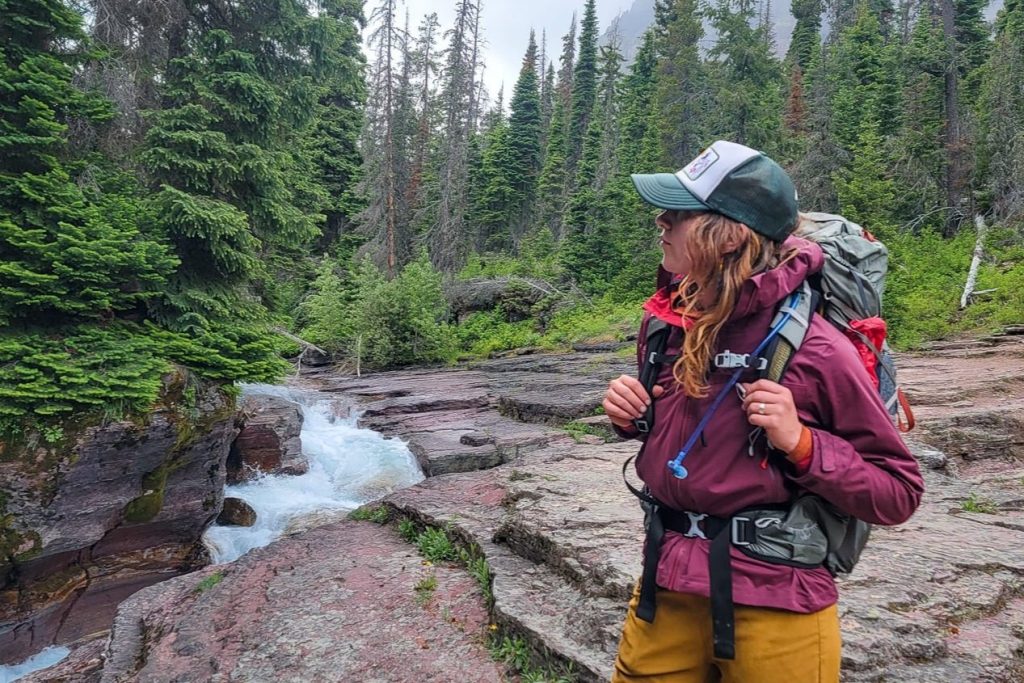
Product Comparison Table
| oSort | Product | Price | Listed Weight | Comfort | Weather Resistance | Ventilation | Durability | Weight Score | 0 |
Patagonia Torrentshell 3L View Men's View Women's |
$179 | 14.1 oz. / 12.4 oz. (men’s / women’s) | 8.5 | 9 | 8.5 | 9.5 | 8 | 1 |
Outdoor Research Foray 3L / Aspire 3L View Men's View Women's |
$250 | 11.9 oz. / 11.7 oz. (men’s / women’s) | 8.5 | 8.5 | 9.5 | 8.5 | 8 | 2 |
REI Rainier View Men's View Women's |
$100 | 11.3 oz. / 9.9 oz. (men’s / women’s) | 8.5 | 8.5 | 8.5 | 8.5 | 8.5 | 3 |
Arc’teryx Beta View Men's View Women's |
$400 | 10.6 oz. / 9.5 oz. (men’s / women’s) | 8 | 9 | 8.5 | 9 | 8 | 4 |
Mountain Hardwear Stretch Ozonic View Men's View Women's |
$230 | 10.7 oz. / 9.9 oz. (men’s / women’s) | 9 | 8 | 8 | 7.5 | 8 | 5 |
Montbell Versalite View Men's View Women's |
$260 | 6.4 oz. / 5.8 oz. (men’s / women’s) | 8 | 8 | 8.5 | 7.5 | 9 | 6 |
Zpacks Vertice View Men's View Women's |
$299 | 5.75 oz. / 5.7 oz. (men’s / women’s) | 8 | 8 | 8.5 | 7 | 8.5 | 7 |
Black Diamond Fineline Stretch View Men's View Women's |
$180 | 11.3 oz. / 9.5 oz. (men’s / women’s) | 8 | 8 | 8 | 7.5 | 8 | 8 |
REI Flash Stretch View Men's View Women's |
$169 | 1 lb. 1 oz. / 14.5 oz. (men’s / women’s) | 7.5 | 8 | 8 | 8 | 7 | 9 |
Outdoor Research Helium View Men's View Women's |
$170 (men’s) / $180 (women’s) | 7 oz. / 6.3 oz. (men’s / women’s) | 7 | 8.5 | 7 | 7.5 | 8.5 | 10 |
Marmot Precip Eco View Men's View Women's |
$120 | 11 oz. / 9 oz. (men’s / women’s) | 7.5 | 7.5 | 7.5 | 7.5 | 7.5 |
|---|
How We Test & Methodology
We measure the performance of rain jackets by examining their comfort and mobility, water resistance, ventilation, weight, and durability.
COMFORT & MOBILITY
To understand which rain jackets are the most comfortable for all-day wear while hiking, we take them out on hikes in a wide variety of weather conditions. We assess the fit and flexibility of the fabric blends, looking for a full range of motion without feeling restricted or encumbered. Specific elements like articulated sleeves, adjustable hoods, and stretchy materials are vital to enhance comfort and freedom of movement. Rain jackets with highly adjustable hems, hoods, collars, and wrists are at the top of this list and make for a customized fit that increases the comfort of the jacket around your body shape and size. Soft inner linings and ergonomic jackets are essential to prevent chafing or discomfort and make the jacket feel cozy and comfortable against the skin or with a base layer.
WEATHER RESISTANCE
We evaluate rain jackets for weather resistance by subjecting them to extended wear in real-world wet conditions and simulated rainstorms. We also check our results against the jacket’s materials technology. We assess the effectiveness of waterproof membranes, seam sealing, and durable water repellent (DWR) coatings to ensure they keep us dry for long days on the trail. Additionally, we consider the quality of zippers, hood design, and adjustability of cuffs and hems to make sure they effectively keep water out.
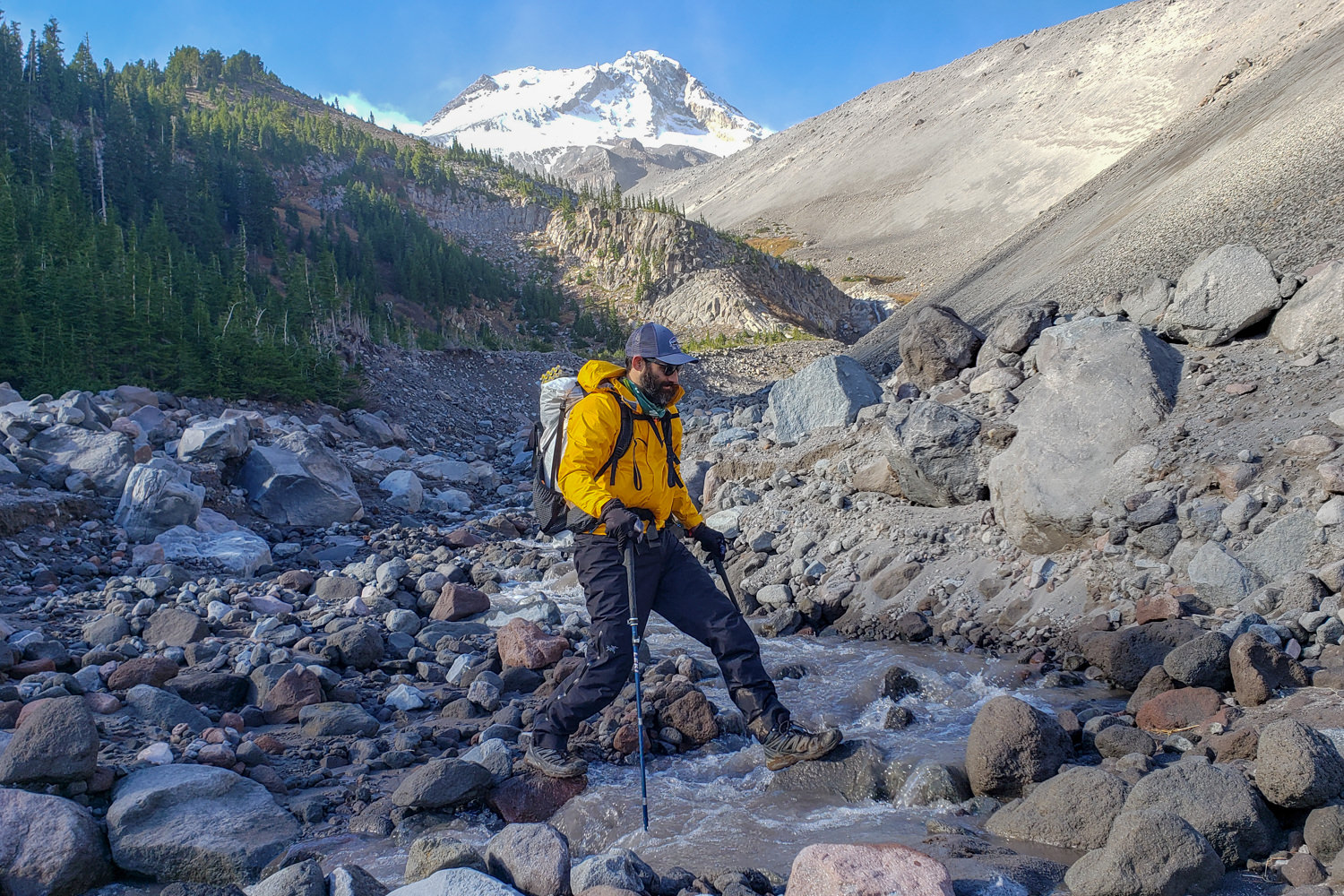
VENTILATION
To test breathability and ventilation, we wear all of the rain jackets we test during a variety of high-intensity activities and diverse weather conditions, from light rain to massive storms with nonstop downpours and even snow. We assess the effectiveness of breathable waterproof membranes, such as Gore-Tex or eVent, that allow sweat and heat to escape while preventing water from entering. We also examine the placement, length, and functionality of ventilation features like pit zips, core vents, and mesh-lined pockets, which are crucial for reducing moisture buildup and shedding excess heat during strenuous hikes. We look at the jacket’s overall construction, including the use of lightweight, breathable fabrics and adjustable components like cuffs and hoods to add a bit of airflow.
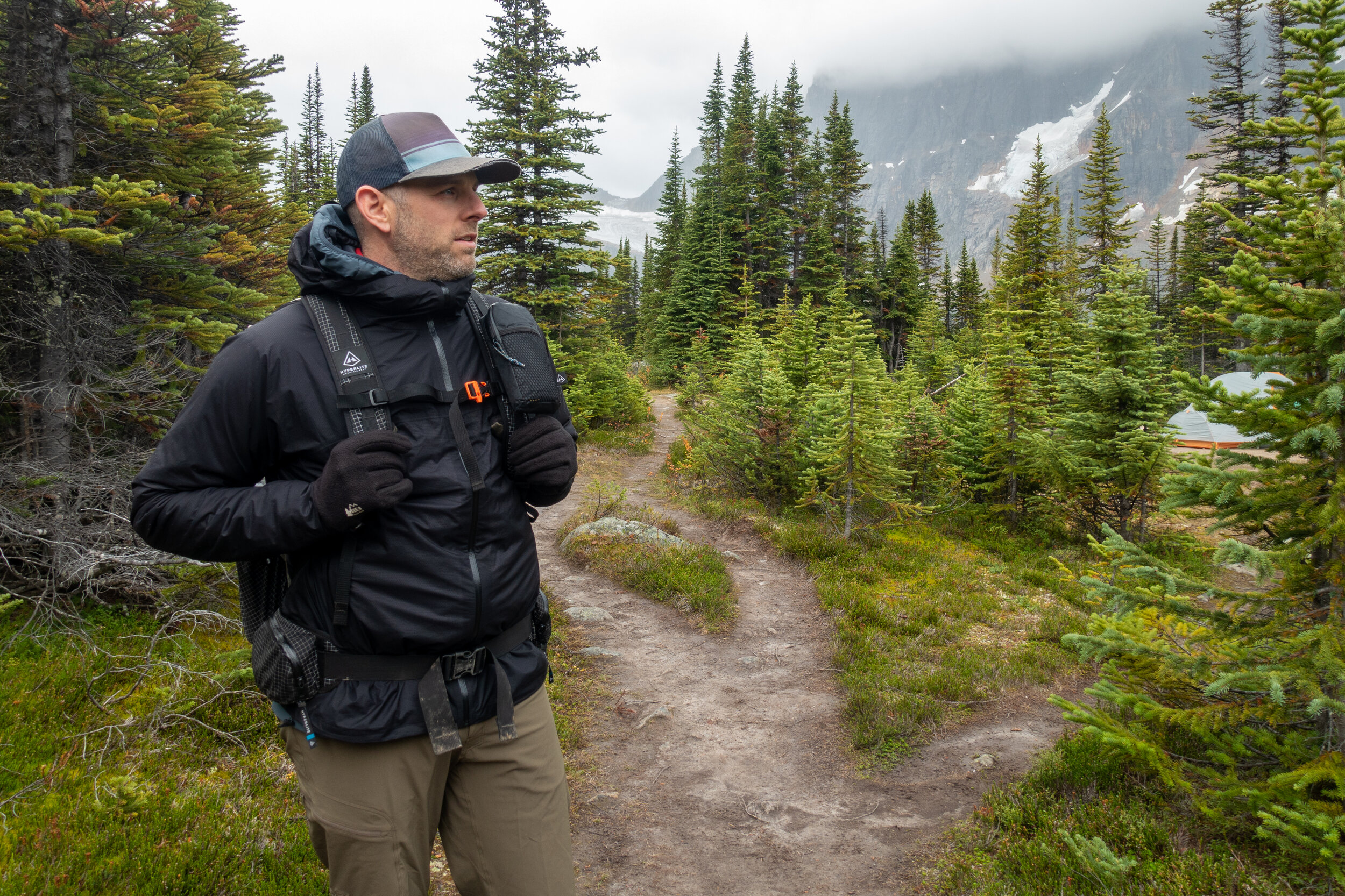
WEIGHT
We weigh each jacket and compare our results to manufacturer specs. We also wear them during day hikes and backpacking trips to assess the jacket’s packability. We take into account specific elements like the type of fabric, construction methods, and pockets and zippers, as they significantly impact overall weight.
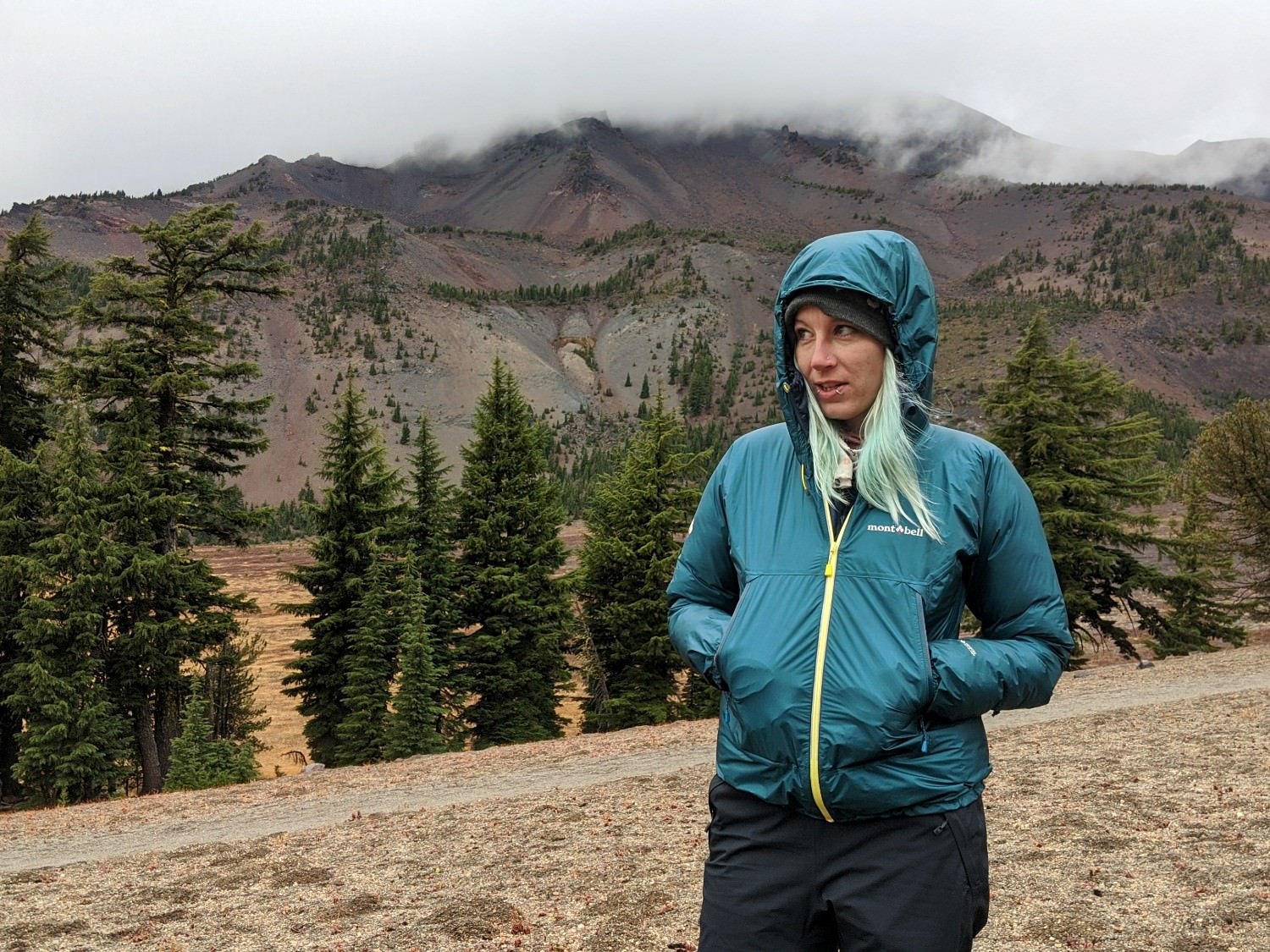
DURABILITY
We use field testing and our wealth of experience to gauge a product’s durability. We subject rain jackets to harsh conditions, including heavy rain, rugged terrain, and repeated use, including stuffing them into our packs day in and day out. We assess the quality of materials like ripstop fabrics and reinforced stitching to make sure they can handle heavy use. We consider seam sealing, waterproof zippers, and reinforced high-wear areas to understand the jacket’s longevity and resistance to damage. We also test the durability of the jacket’s coatings and membranes to see how they maintain waterproof properties over time and how that contributes to the life of the coat.
Why Trust CleverHiker
From the rainforests of Oregon and the summer monsoon of the Rocky Mountains to the swampy and soggy Appalachians, we’ve put over 1,000 days of downpours to good use and whittled down this list to the best of the best rain jackets. Gear Analyst and lead tester, Ian Krammer, has spent most of the last decade hiking, climbing, and exploring the Colorado Rockies from spring until fall testing jackets under harsh conditions. Combining his lifelong passion for the outdoors with his experience in product sales and analysis, he’s developed a sharp eye for high-performance products. This methodical approach guarantees the jackets listed here are the best for tackling wet weather on trail.
With contributions from Gear Analyst, Miles Knotek, we bring new updates and in-depth reviews. Miles has adventured worldwide from Iceland to New Zealand, Costa Rica to the Rockies, and has found how the right gear can have a big impact on an adventure. Calling Alaska home, he regularly recreates in some of the harshest and rainiest weather. He is no stranger to long and wet days on the trail. With an eye for detail and a penchant for finding the limit of his gear, Miles takes an analytical approach to testing. Everything he uses he puts to rigorous use and is sure to shake out every last detail to create the most comprehensive review possible.
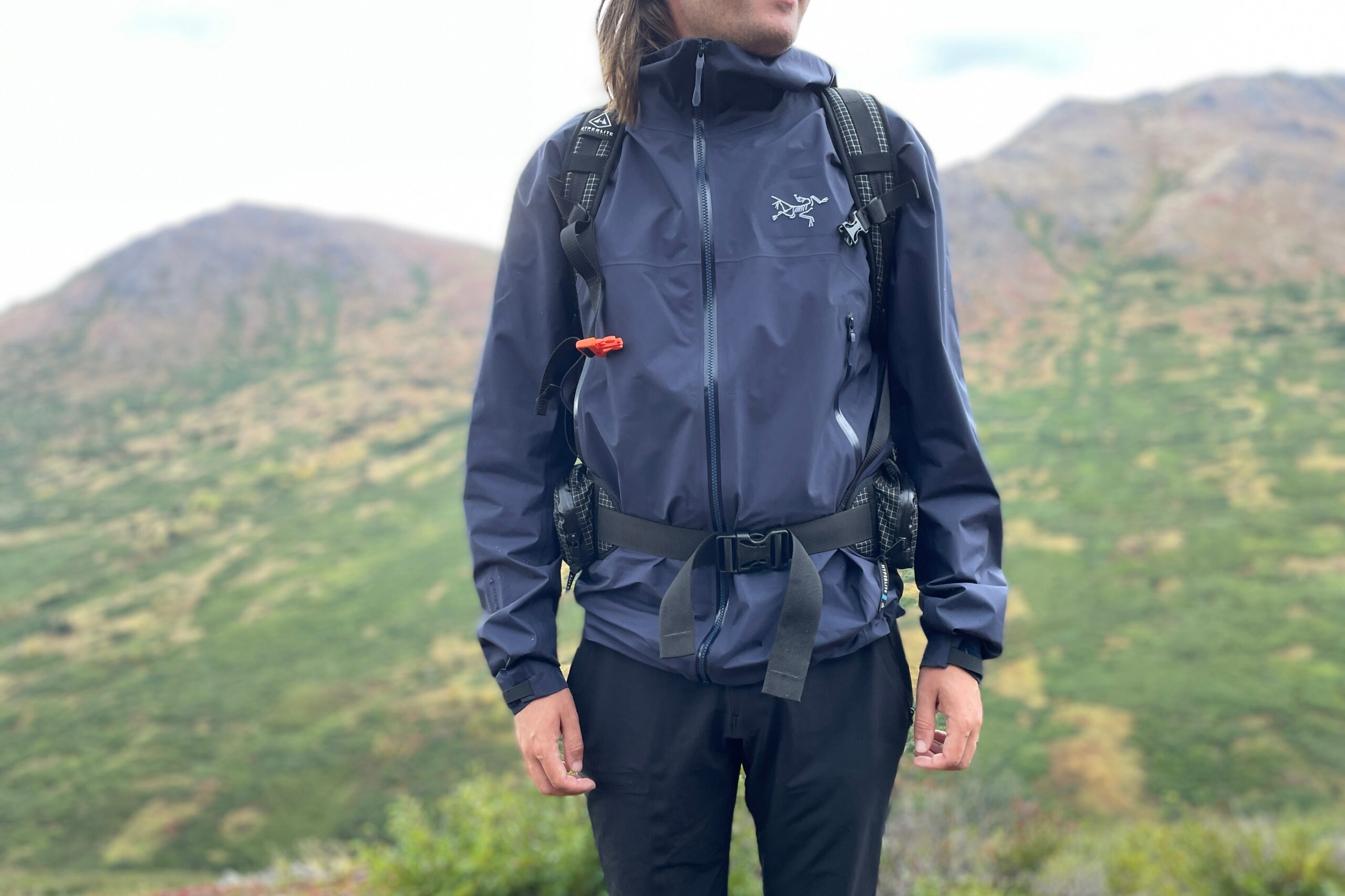
Analysis & Results
To determine the best rain jackets, we evaluate each model based on their overall comfort and mobility, water resistance, ventilation, weight, and durability.
VALUE
For us, value is about achieving the best performance for every dollar spent. We choose rain jackets that showcase excellent quality, whether they are on the pricier side or are more budget-friendly.
As one of the most affordable jackets on our list, the REI Rainier offers unbeatable value with its durable construction, versatile features, and affordable price point. This one rivals some of the most expensive jackets when it comes to wet conditions but for half – or even a quarter – of the price.
The Marmot Precip Eco also stands out as a top value pick with its eco-friendly materials, reliable waterproofing, and budget-friendly price tag. By design, weight, and materials, it’s nearly identical to the REI Rainier but offers slightly longer pit zips, more colorways, and the same high-quality rain protection for a slightly higher price.
The Patagonia Torrentshell 3L is one of the most reliable rain jackets we’ve tested and stands out for its superior waterproofing, durable construction, and ethical manufacturing practices. This jacket is more expensive than the Rainier or the PRecip Eco, but it will help keep you reliably dry and comfortable for multiple seasons without breaking the bank.
Last, we highly recommend the Mountain Hardwear Stretch Ozonic. Sure, this one is two to three times more expensive than the Rainier and Precip Eco, but it’s a long-term investment in quality and durability. This jacket combines technical performance with excellent value thanks to stretch fabric, an ergonomic design, and excellent waterproofing.
COMFORT & MOBILITY
Rain jackets with stretch fabric take top marks in this category, and the Mountain Hardwear Stretch Ozonic is the best when you need lots of freedom of movement for maximum comfort while hiking, climbing, and moving. One of our favorite elements of this jacket is its zipper guard at the collar, which keeps the cold zipper off your chin and neck.
The Arc’teryx Beta stood out to us for its trim yet comfortable design. An athletic cut fits slender bodies well while still allowing ample room in the shoulders and arms for movement. We were able to layer multiple layers underneath with no problem and never felt restricted. The Gore-Tex used is quiet and lacks that loud crinkle and crunch of other heavy-duty jackets.
The Montbell Versalite is also in the mix. Although its fabric is noticeably more structured and a bit less stretchy, we find it still very easy to move in and comfortable for long days.
For a budget jacket, we were pleasantly surprised with the comfort and mobility provided by the REI Rainier. The torso came larger than other jackets, which forced us to size down to find a better fit. Once properly sized, we never experienced any restrictions or felt tighter in this slightly looser-fitting jacket.
All four jackets offer articulated sleeves that allow for natural arm movement without restriction. We also love that they include adjustable cuffs with closures that can be tightened or loosened for a better fit and more airflow, as well as drawstring hems and hoods to make you feel as comfortable as possible.
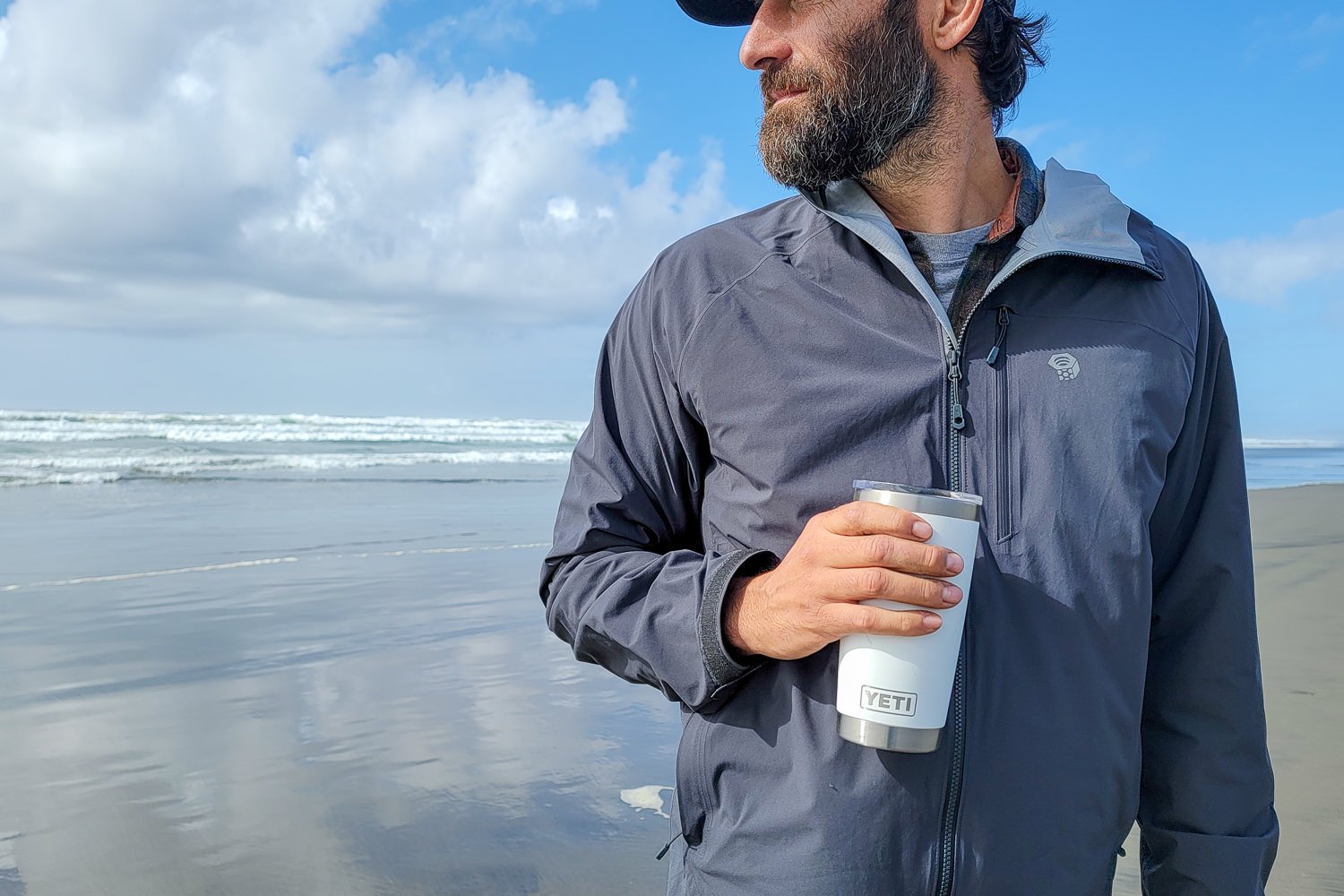
WEATHER RESISTANCE
Multiple layers of waterproofing materials that use high-quality fabric blends like Gore-Tex or eVent membranes give excellent waterproofing capabilities, and the Patagonia Torrentshell 3, Arc’teryx Beta.
If we were to use only one jacket over and over in the heaviest rain and wind, it would be the Arc’teryx Beta. We tested this jacket repeatedly in some of the heaviest rain and wind, along with some early winter snow, and it kept us warm and dry the entire time. With taped zippers, there is no need to worry about water seeping in the pockets or main zipper. This jacket is in a class of its own for its ability to withstand heavy rain and wind.
With its three-layer construction, the Patagonia Torrentshell is a solid option for when the weather turns nasty. We tested this jacket in the persistent dampness of Alaska’s temperate rainforest and it withstood the elements. Water quickly and easily beaded off the shoulders and hood and withstood hours of being out in the rain without wetting through. We will continue to reach for this jacket for long exposure to heavy rain.
The Patagonia Torrentshell also stands out for its storm flap over the zipper as an extra measure to seal out moisture and wind. While this extra bit of material isn’t necessary to stay dry, it adds extra weather resistance. That said, we’ve stayed bone dry in the Arc’teryx Beta and Outdoor Research Foray 3L / Aspire 3L thanks to their excellent seam sealing.
The Outdoor Research Foray / Aspire are also at the top of their game when it comes to water resistance. The Torrentshell 3 and the Arc’teryx Beta are both 3-layer jackets and are outstanding for repelling moisture so water beads off the surface of the jacket.
All of these jackets are treated with DWR coating to ensure long-lasting protection against precipitation. Their highly adjustable cuffs, hems, and hoods with a brim help shield your head and face from rain.
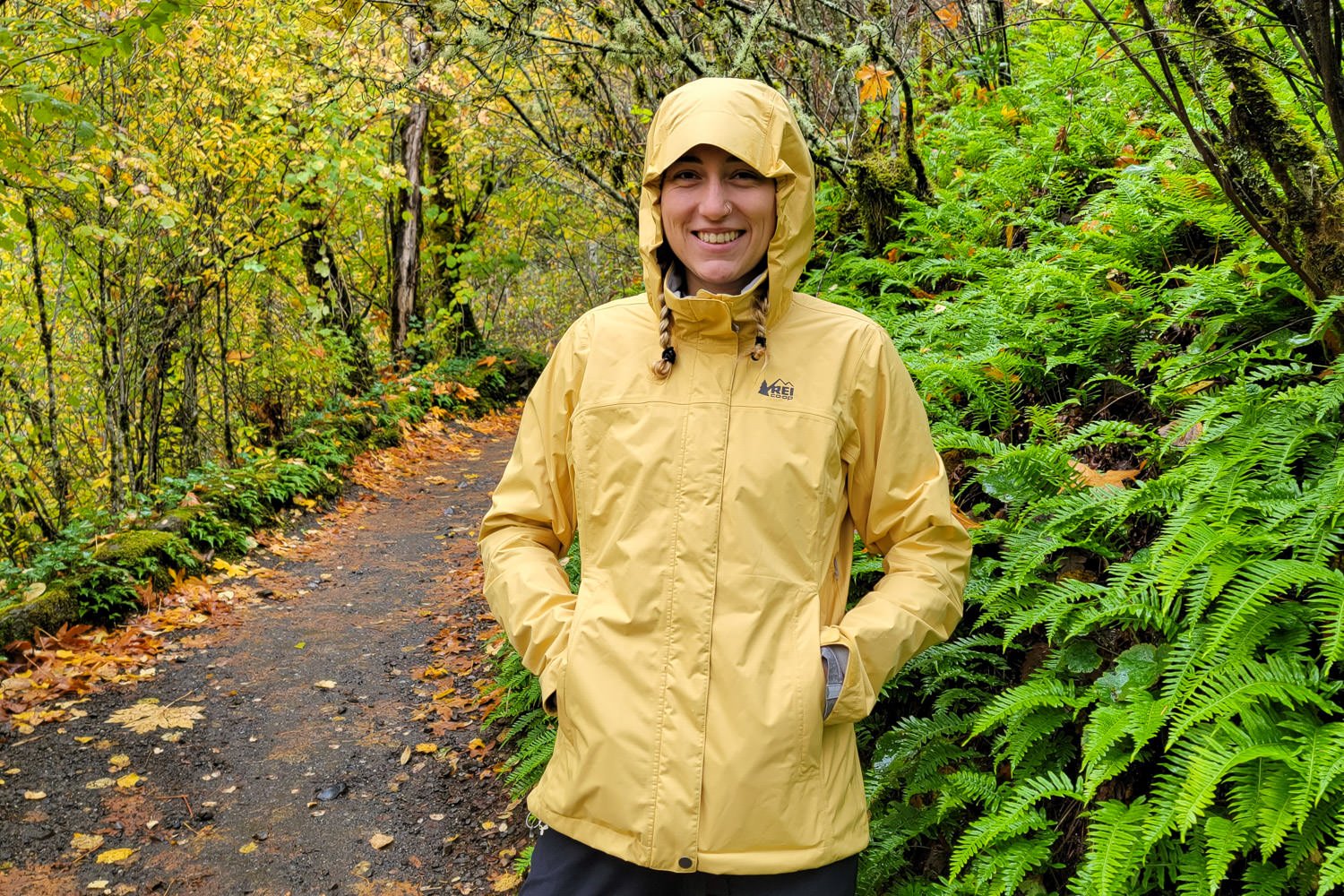
VENTILATION
Pit zips, or extended zippers under the arms, are the first thing we look for when it comes to dumping heat and excess moisture to maximize ventilation while hiking, and the Outdoor Research Foray 3L / Aspire 3L has superior venting. In fact, it has the largest zips of any jacket we’ve reviewed and provides unparalleled breathability. With double zips that extend from the triceps to the hem of the jacket, hikers can unzip the jacket almost in half to provide the highest degree of breathability. We love the double zippers for the ability to customize how much ventilation is provided. This jacket is great for those who often find themselves heating up on hikes and needing the most ventilation.
The Mountain Hardwear Stretch Ozonic, REI Rainier, and Patagonia Torrentshell 3L also include large pit zips for added breathability, although their openings are an average size that’s still very effective at regulating airflow.
The Monbtell Versalite is specifically made as an ultralight and ultra-breathable jacket, and we found it delivers on those promises. We tested this jacket on up-tempo hikes and multiple runs and found it to be very breathable even when fully zipped up. It left us with minimal clamminess and continued to impress us during our tests. Also coming with oversized pit zips, the Versalite is the jacket to go for high ventilation in an ultra-light platform.
All four jackets also feature adjustable cuffs and an adjustable hem, which allows you to increase airflow around the wrists and waist. These models are also outstanding for ventilation thanks to their innovative and breathable fabrics that allow moisture like sweat to escape, but mist, rain, and snow to stay locked outside.
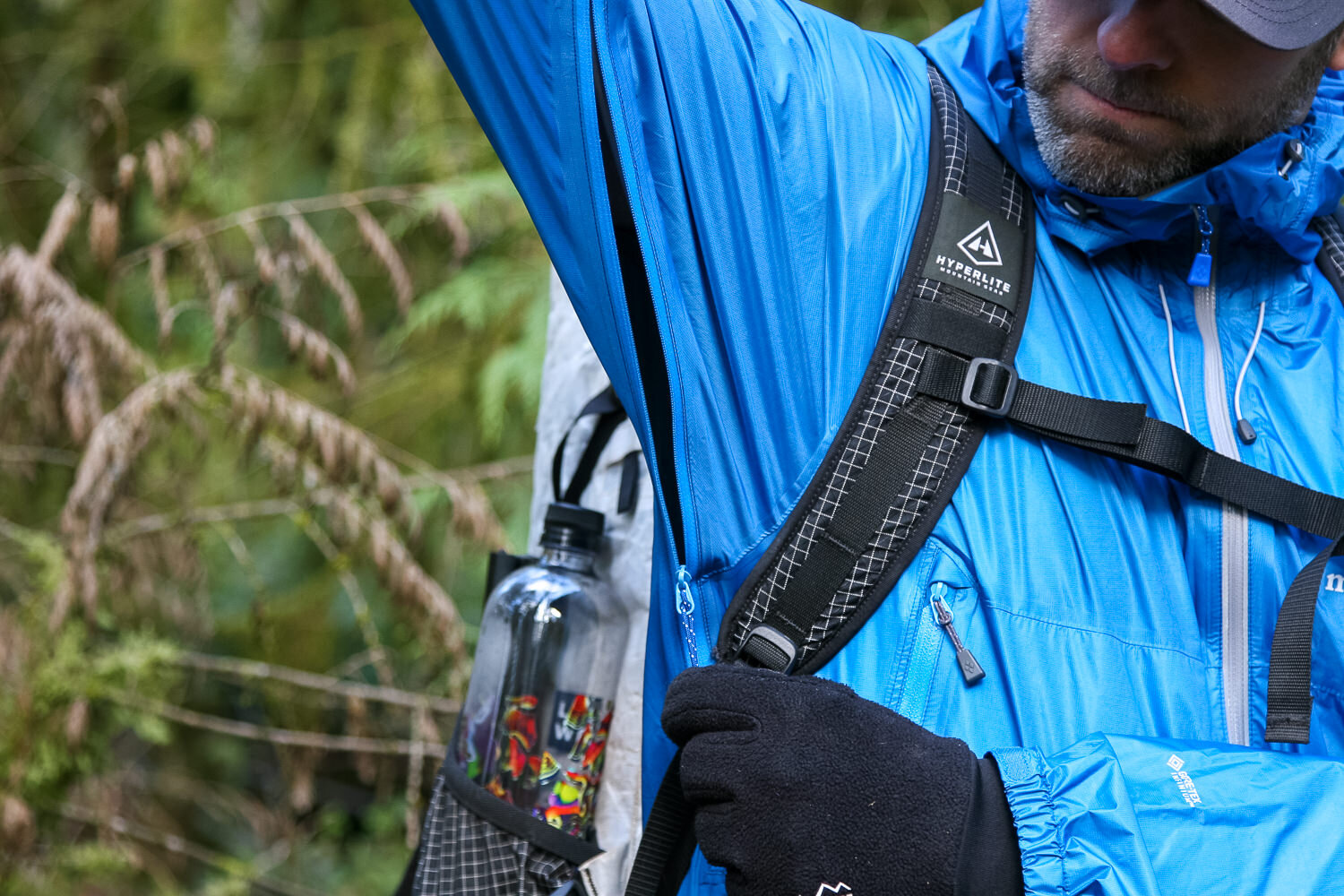
DURABILITY
We test products again and again under heavy conditions to gauge their durability. The Patagonia Torrentshell 3L stood out in this metric. After taking it through brush and multiple downpours, the integrity of the material was unaffected and continued to look brand new. The three-layer construction provides superior durability and we will keep this jacket in regular rotation for heavy use.
Despite its high price tag, the Arc’teryx Beta is also tops for its durability. Compared to other jackets of similar weight, the Beta lasts longer and is tougher. We love the trim design without extraneous seams or features to wear out and were impressed with its resilient Gore-Tex that retained its weather resistance hike after hike.
The Outdoor Research Foray II is also one of the most durable. Weight and durability often go hand in hand and we found this to be true with this jacket. The Foray II’s external material is crisp and thick providing extreme levels of durability. It’s a robust jacket that we have no hesitation using for heavy days where brush and scrapes with the terrain are common.
WEIGHT
When it comes to ultralight performance, we look for jackets that weigh less than seven ounces, and the Zpacks Vertice, Montbell Versalite, and Outdoor Research Helium are our top choices. Each of these jackets is constructed with ultralight materials and a minimalist design to keep weight to an absolute minimum while still providing excellent protection from the elements.
By removing pockets altogether, the Vertice lands as the lightest jacket in our review, without sacrificing adjustability thanks to cinch cords at the hood, cuffs, and hem. The Helium is a very close second and adds a single zippered chest pocket.
If you’re the type of hiker who is weighing every item in your pack and is always searching for the lightest option, then the Montbell Versalite is another top option. Coming in at a feather-light six ounces, it’s about half the weight of many of its competitors. We often would stuff this in our pack as a just-in-case layer and would regularly forget we were carrying it. Coming with an included stuff sack, it packs down to the size of an apple for easy carrying in the smallest of spaces. this jacket also offers two handwarmer pockets, although it sits at just a hair heavier than the other two.
For a budget rain jacket, we were pleasantly surprised with the Marmot Precip Eco. With a lower measured than listed weight, it’s lighter than many pricier models. It is also easily packed into its own pocket and compresses down nicely, something that not all budget jackets can do. For a surprisingly low-weight jacket at a great price, it’s hard to beat the Marmot Precip Eco.
How to Choose a Rain Jacket
NUMBER OF LAYERS
The number of layers in a rain jacket correlates to price and long-term efficacy. Here is what you can expect with each layer:
2-layer jackets are the most common and affordable. They’re typically constructed with an outer shell coated in a Durable Water Repellent (DWR) combined with a breathable liner.
2.5-layer jackets are usually the lightest rain jackets and are made with the same DWR-coated outer as 2-layer options. The inner layer of a 2.5-layer jacket is typically a thin polyurethane coating that helps keep sweat and dirt from clogging the breathable pores of the jacket from the inside.
3-layer jackets are the most effective in heavy moisture and they incorporate all of these elements: they have a DWR-coated outer shell, a breathable and waterproof mid-layer, and a polyurethane lining for the innermost layer. They also tend to be the heaviest.
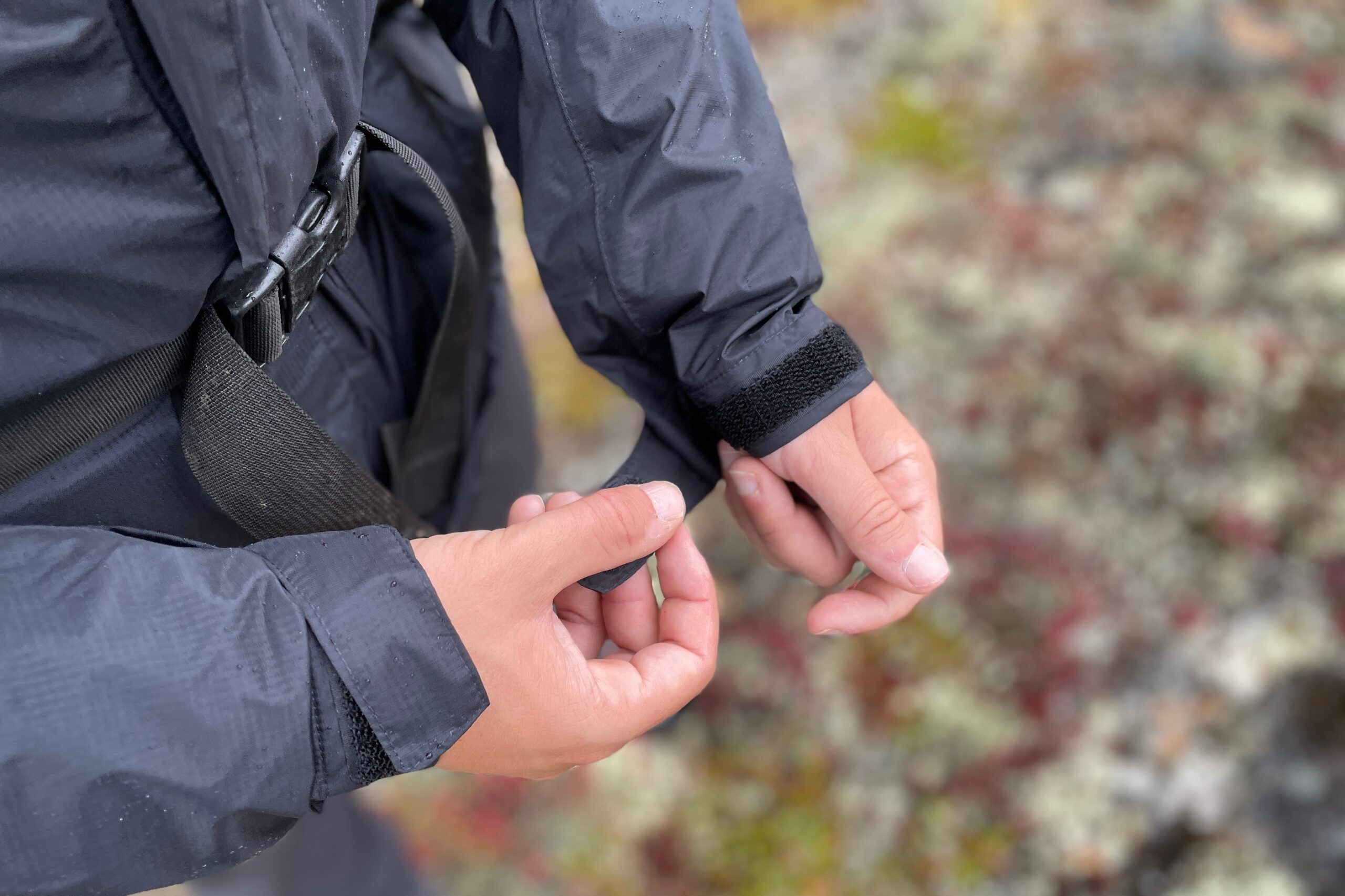
PIT ZIPS
Zippered openings at the armpits, aka pit zips, are great for letting excess heat escape if you get too warm while hiking uphill or being active. It’s always nice to have the option for more airflow when you’re sweating through a tough ascent in a deluge or feeling a bit too warm during a misty afternoon on trail.
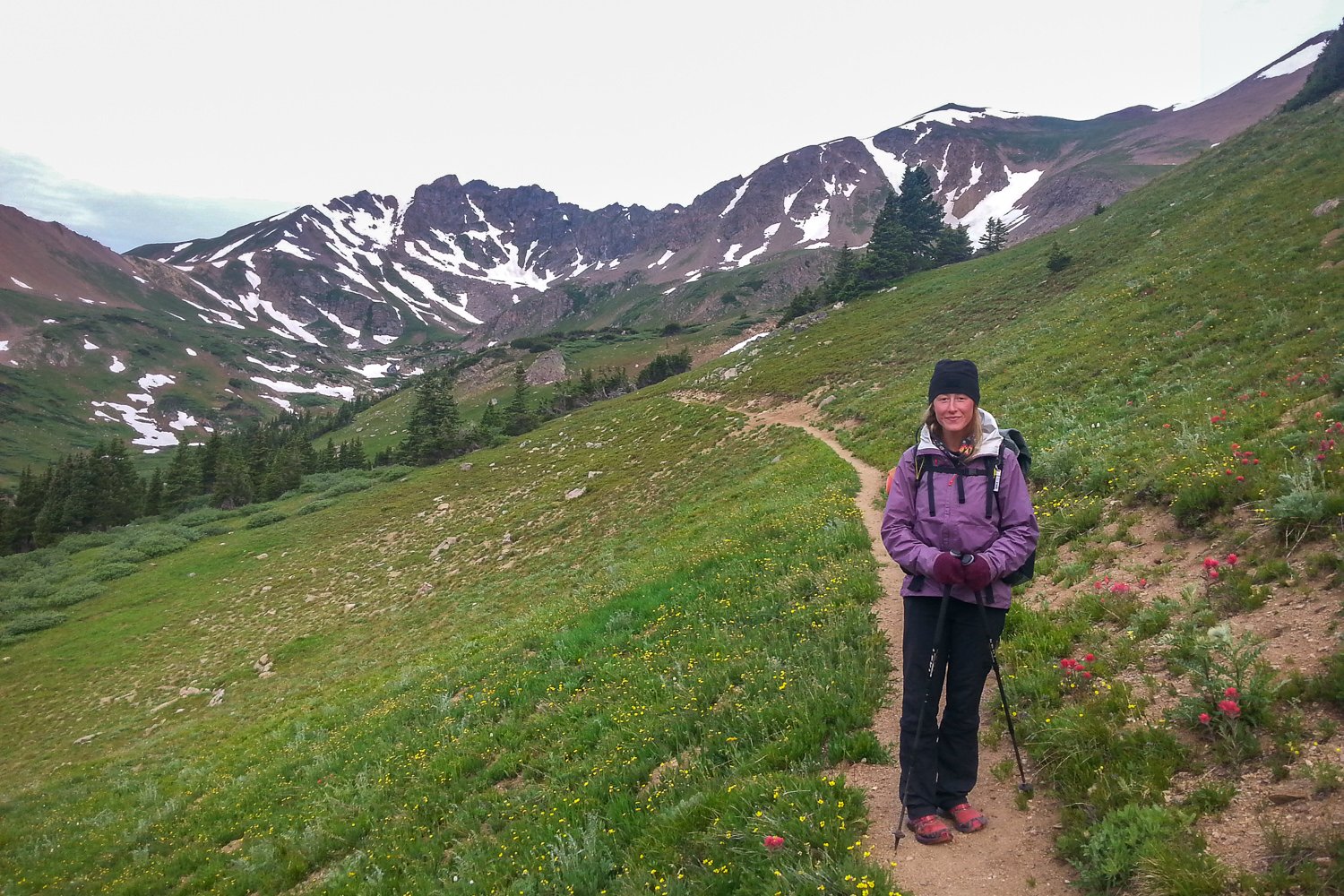
CONDENSATION
If you’re wearing a rain jacket on a cold, rainy day, condensation will almost certainly form on the inside fabric. This leads many people to think that their rain gear is failing, even though it’s still waterproof and very much doing its job. If your jacket is new or has been well-maintained over its life, don’t worry too much if you feel wetness forming inside your jacket. The chances are very high it’s just trapped condensation, and it will evaporate with your body heat as long as you’re wearing appropriate wicking layers underneath and you maximize the ventilation.
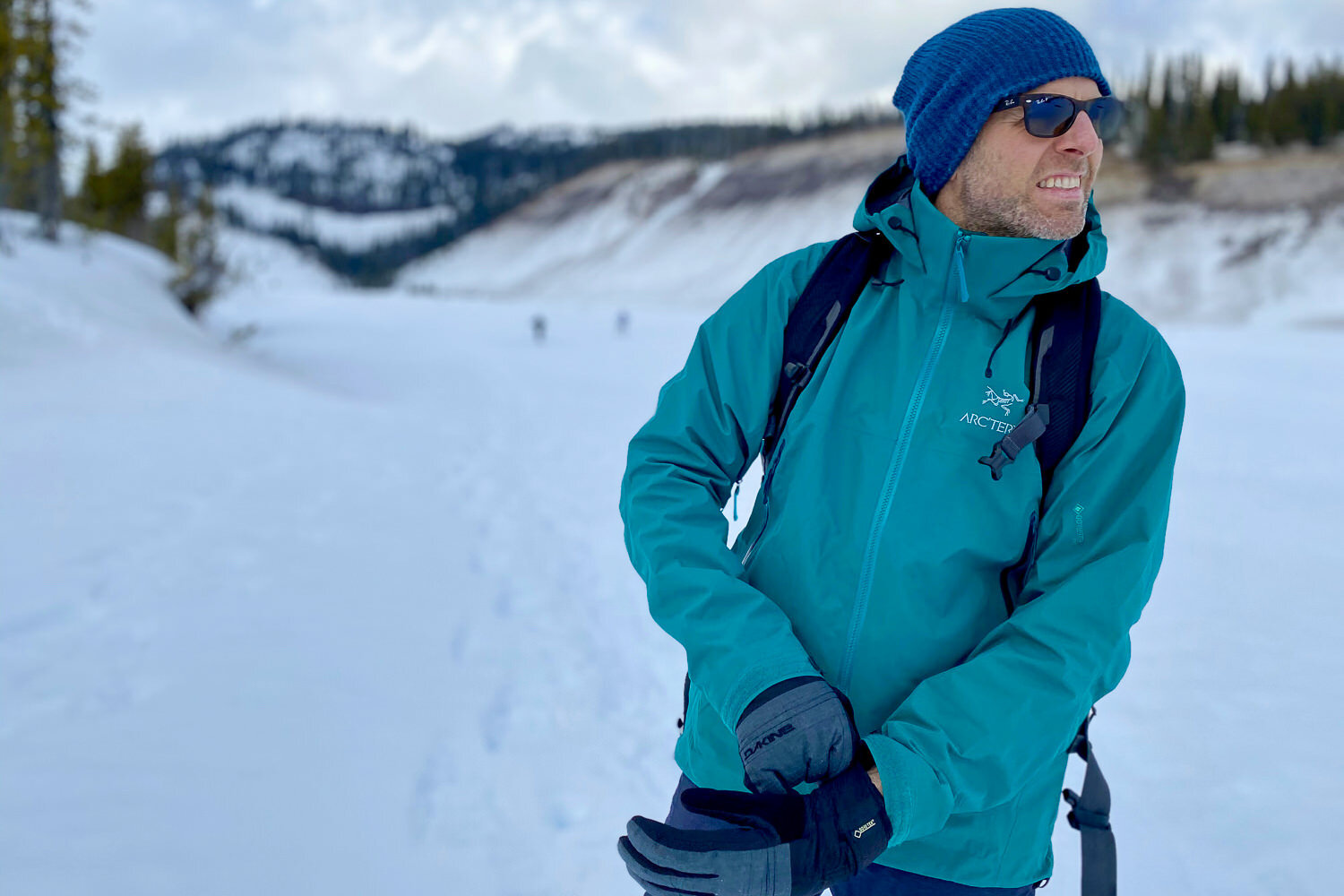
How To Stay Cool & Dry In A Rain Jacket
Getting hot and sweating when you’re working hard in a rain jacket is inevitable, and condensation build-up in chilly conditions is very normal and to be expected. Here are our top tips for staying cool and dry in your new rain jacket:
- Start cold – We recommend a single base layer under your rain jacket, especially if you hike quickly, or will be heading uphill right out of the gate. Using your go-to lightweight wool / synthetic t-shirt or base layer top under your rain jacket will feel cold at first, but you’ll find that it takes just a few minutes of movement before you start to warm up.
- Ventilate – You can quickly and easily dump heat through the pit zips, bottom hem, wrist cuffs, and front zipper. Finding the right amount of breathability is key, so consider taking a bit of time while hiking to make the micro-adjustments that will keep you cool and comfortable.
- Slow down – Moderating your pace will slow your heart rate and reduce sweating. If you find yourself a bit too warm or your jacket beginning to “wet out”, consider slowing your steps.
- Drink water – Drinking cold water regularly will cool you from the inside out. Just because it’s raining doesn’t mean you don’t need to hydrate, so be sure to drink up while you trudge through that tempest.
- Shed layers – When you’re hiking, temperature regulation is simply a layering game. If you find yourself overheating – or getting too cold – consider taking off or putting on a hat and gloves or a wicking mid-layer.
- Use rain pants – No waterproof clothing system is truly complete without quality rain pants. Check out our guide to the Best Rain Pants for our favorites.
- Waterproof footwear – For wet days and soggy hiking adventures, you’ll want to be waterproof from head to toe. Consider picking up a pair of waterproof hiking boots (Men’s / Women’s), hiking shoes (Men’s / Women’s), or rain boots (Men’s / Women’s) to keep your feet dry.
- Umbrella – Consider using a hiking umbrella not as a replacement for a jacket, but in addition. This is a great way to mitigate how wet your outer layers become, helps direct unrelenting rain away from you while moving, and offers unrivaled breathability on moist, warm, and hot days.
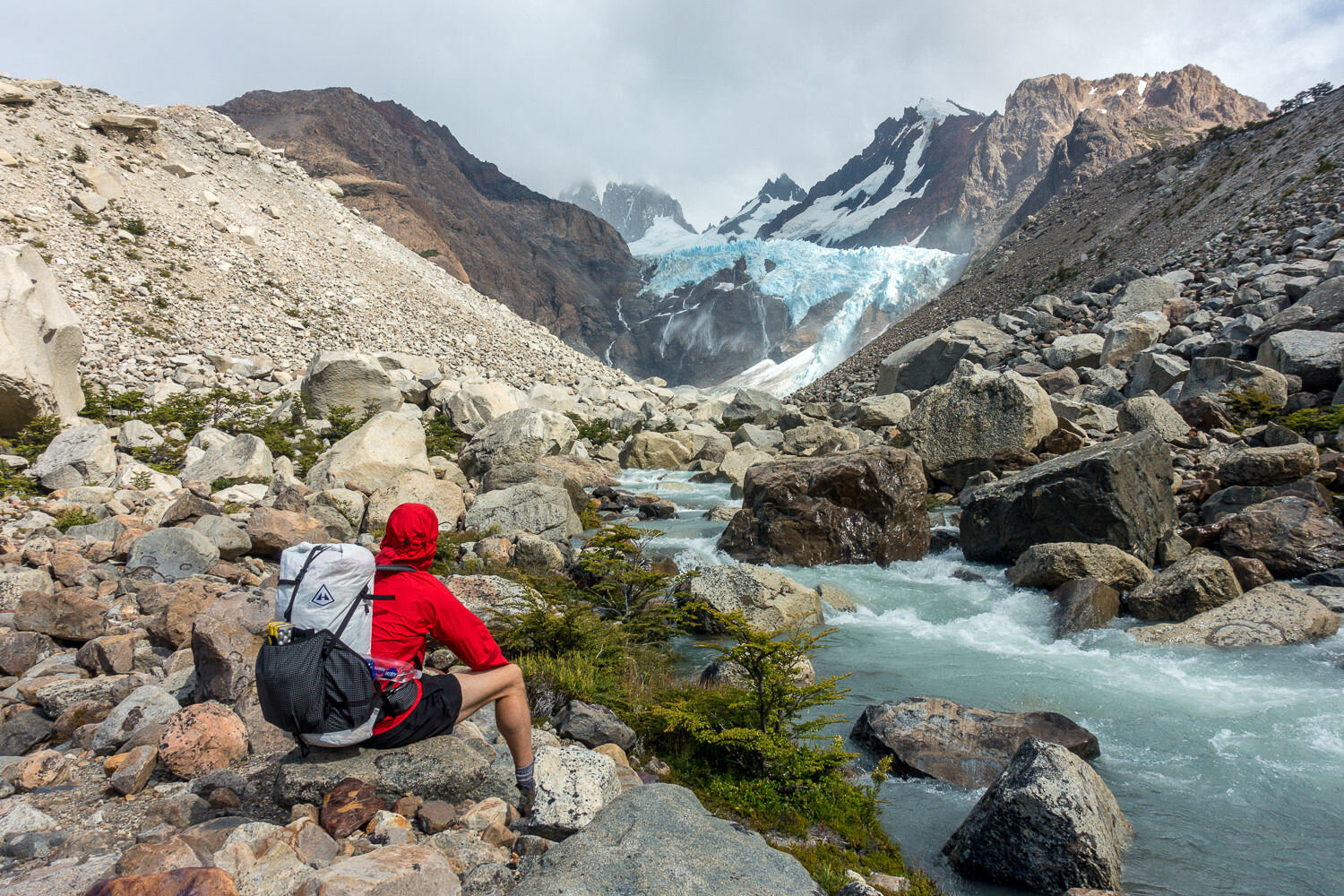
Honorable Mentions
You never know if this diamond in the rough might be perfect rain jacket for you:
Frogg Toggs Xtreme Lite (Men’s / Women’s)
The Frogg Toggs Xtreme Lite jacket is inexpensive and serviceable. As thru-hikers, backpackers, and peak baggers, our team of gearheads knows that sometimes the lightest, cheapest gear really is enough – and that’s the space where this jacket lives.
For only $60, the Xtreme Lite offers the core features we want in our top hiking rain jackets: handwarmer pockets, and adjustable wrists, hem, and hood. On top of that, this model packs into itself and weighs only 10 ounces. CleverHiker Gear Analyst, Casey Handley, carried Frogg Toggs as her outer shell for the northern 500 miles of the Arizona Trail. The Xtreme Lite functioned as a windbreaker in the cold wind, and a just-in-case layer for a rare desert downpour, and it was fine for both uses.
Though The Xtreme Lite is simply not as durable, breathable, waterproof, well-fitting, or feature-rich compared to the jackets above, it has its place. If you’re looking for an inexpensive jacket for mild conditions and arid places with occasional cloud bursts, Frogg Toggs are a solid option.
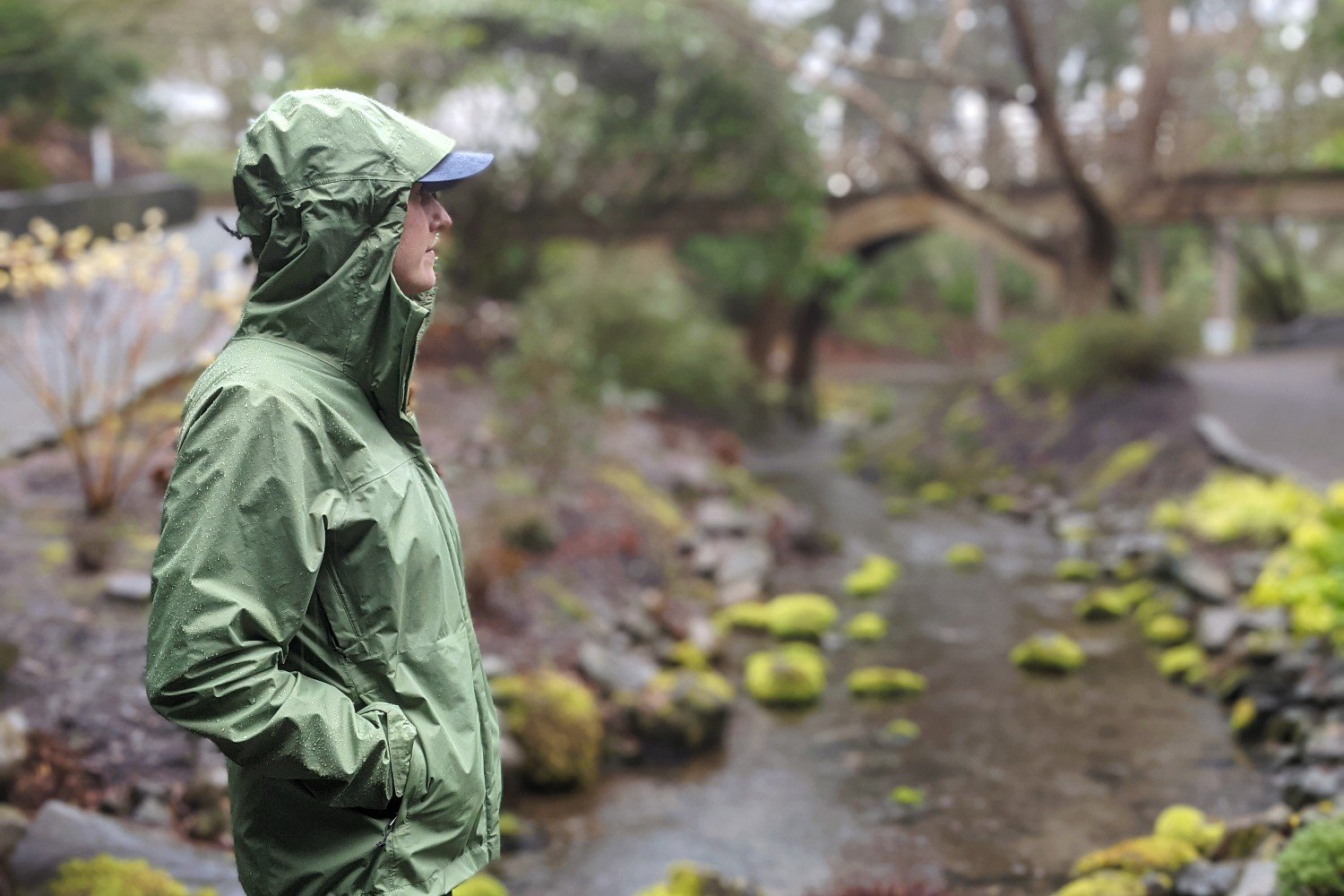
Best Ponchos
If your top priorities are full coverage and low weight, a poncho can be a great piece of gear. They are perfect when light or occasional rain is the norm. Though they can fall short when it comes to warmth and durability, a poncho might just be the right pick for you.
Outdoor Products Multipurpose Poncho
The Outdoor Products Multipurpose Poncho does everything we want a poncho to do. A simple drawstring hood cinches around your face, and a waterproof, seam-sealed, billowy body keeps your head and torso dry while offering plenty of breathability and freedom of movement for your arms. We like that the Multipurpose Poncho weighs nine ounces, folds down super small, and comes with a mesh zippered carrying case.
It’s fast to deploy and offers just enough coverage for your body when a downpour hits. Because this poncho is so lightweight, it also dries fast. For only $35, it’s a small and durable investment for the next time you’re caught in a brief rain shower or need a bit of extra coverage while setting up camp in the backcountry.
The Packa Poncho is a hybrid jacket, pack cover, and poncho. The Packa is a regular poncho – featuring a simple hood with the same extended material in front – but it adds a large, articulated back to also cover your backpack. For distance backpackers and thru-hikers dreaming of an all-in-one rain cover when rain storms hit, the Packa might just be what you’re after.
Several impressive, unique details solve many common poncho problems: massive sleeves slip on easily over other layers (and feature massive 20-inch pit zips to throw heat), and the hem and wrists have drawstrings to prevent billowing material. We’re especially smitten with the fact that you can put on the entire poncho in less than 30 seconds without taking off our packs.
Though it’s a bit heavy and bulky to store – between 13 and 18 ounces, depending on the fabric you choose, and it’s a bit pricey for a poncho, it is a unique and dynamic product, that’s worth every penny.
Six Moon Designs Gatewood Cape Poncho
For ultralight hikers who want the ultimate 2-in-1, the Six Moon Designs Gatewood Cape Poncho doubles as a shelter. This model is both a solid, reliable tarp that uses guy lines and a hiking pole for nights on the trail where protection is key, and a serviceable poncho for when summer rain storms start building and you’ve got miles to go.
However, combination gear always involves trade-offs. The Gatewood is made of a thin sil-nylon that’s prone to ripping and tearing, so you’ll need to be extra careful when wearing it near underbrush or places where it can snag. While we love the weight savings of the Gatewood Cape’s dual functionality, we learned the hard way that it is only a pro until you’re trying to set it up as a shelter while it’s raining. And, the Gatewood takes some practice to pitch, so you’ll want to have it down ahead of time.
We’ve seen the ultra-versatile Gatewood gaining traction out on the trails more and more over the last few years, and for good reason – when it comes to a rainproof option and lightweight shelter for a low price, the Gatewood Cape Poncho is tough to beat.
Best umbrellas
An umbrella is one of the most overlooked pieces of rain gear on the trail. Though it’s not a replacement for a quality rain jacket, it can be a real game changer when combined with one. Staying dry (and therefore warm) is essential to your well-being, and for a small weight penalty, you get incredible versatility from umbrellas like the ones below.
Though umbrellas fall short in high winds and lightning, they are a very worthwhile addition in both scorching desert heat and pouring rain.
Gossamer Gear Lightrek Umbrella
The Gossamer Gear Lightrek Umbrella is a robust ultralight umbrella with a shiny, sun-shielding exterior. CleverHiker Managing Editor, Ben Applebaum-Bauch, used the Lightrek on his thru-hike of the 3,000-mile Continental Divide Trail as a complement to his rain jacket and it was an absolute game-changer. It was a vital piece of gear not only for all-day protection from the sun but in the early season snow, heavy rain, and hail of the high Rockies.
We’re big fans of the Lightrek’s chromatic outer layer, which keeps intense UV rays and mid-day desert heat away from the user, and it can even help lower the temperature underneath. This umbrella also has pack attachment straps (sold separately) and stores narrow (but long) in your pack.
We’ve found the Lightrek excels in all conditions except for sustained high winds – but to be fair, it’s plenty durable for a 6.3-ounce umbrella. This thing will last for years if you take proper care of it, and we wouldn’t hesitate to recommend it for long adventures in rain or shine. For only $39, the Lightrek is a bargain.
Six Moon Designs Rain Walker Umbrella
At 5.5 ounces, the Rain Walker Umbrella is a low-bulk and efficient ultralight umbrella. If you’re looking for serious coverage at the lowest weight possible, the Rain Walker is a great choice: at full size, it easily covers one hiker and their backpack from the elements. CleverHiker Gear Analyst, Heather Eldridge, uses the Rain Walker for local hikes in Oregon.
Thanks to flexible, wind-resistant ribs, the closed umbrella packs up ultra-thin – barely the diameter of a quarter – and collapses down to about two feet. It’s easy to store, fast to deploy, and we love the soft EVA handle for holding over a long time. Plus, Six Moon also offers attachments for securing your umbrella to the shoulder strap of your backpack so you can hike hands-free.
The downside of the Rain Walker is it’s a bit less durable than other options on the market, and it doesn’t come with a reflective outer layer. If sun shade is a priority for your umbrella, we highly recommend the Silver Shadow or the Silver Shadow Carbon by Six Moon as well.
The ZPacks Lotus has a strong and balanced construction. It also offers the widest diameter of these three umbrellas at a whopping 38 inches, which provides a ton of shade and rain protection.
We really like the attachment method (sold separately) for the Lotus umbrella. Instead of two stretchy ties, one of the “holsters” is a low-bulk clip that attaches directly to the strap of your backpack. We find that this design offers more stability for the umbrella, and needs less tweaking and adjusting over time.
That said, the Lotus itself is the most flimsy in wind compared to the other umbrellas on this list. We find a sudden breeze can dramatically strain the ribs under the material. The handle is also small and less comfortable. However, the Lotus is an outstanding option for long-distance treks: its chromatic exterior will reflect the sun’s heat, it packs small and is under seven ounces.
Conclusion
Choosing the ideal rain jacket can feel overwhelming. We hope this guide offers valuable insights to help you find the perfect jacket for your next adventure based on comfort and mobility, weather resistance, ventilation, weight, and durability so you can embrace the elements with confidence on your next hike.
